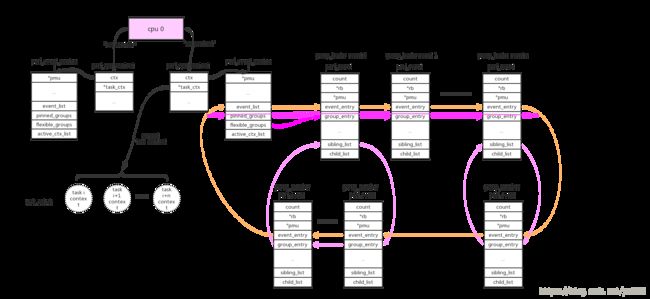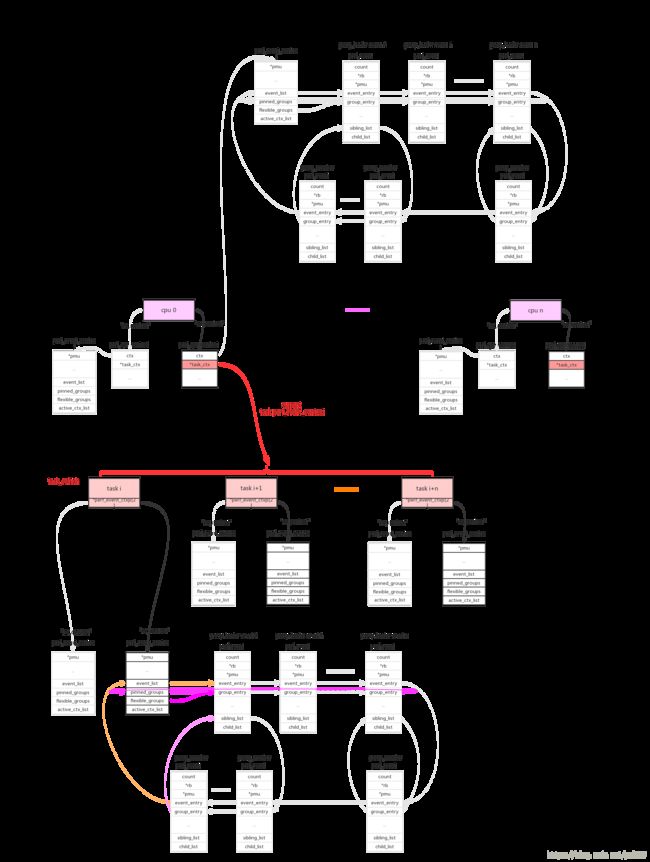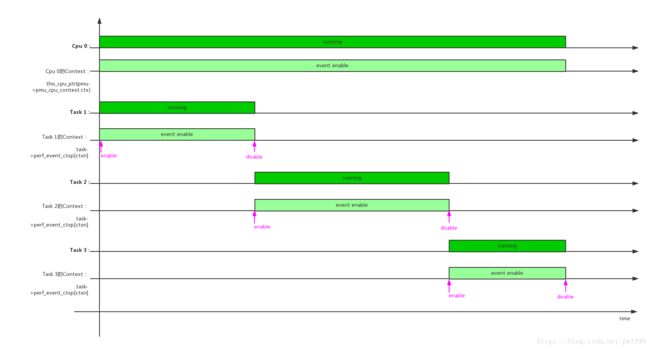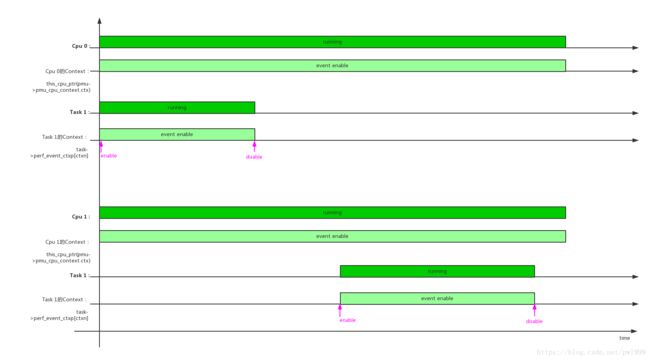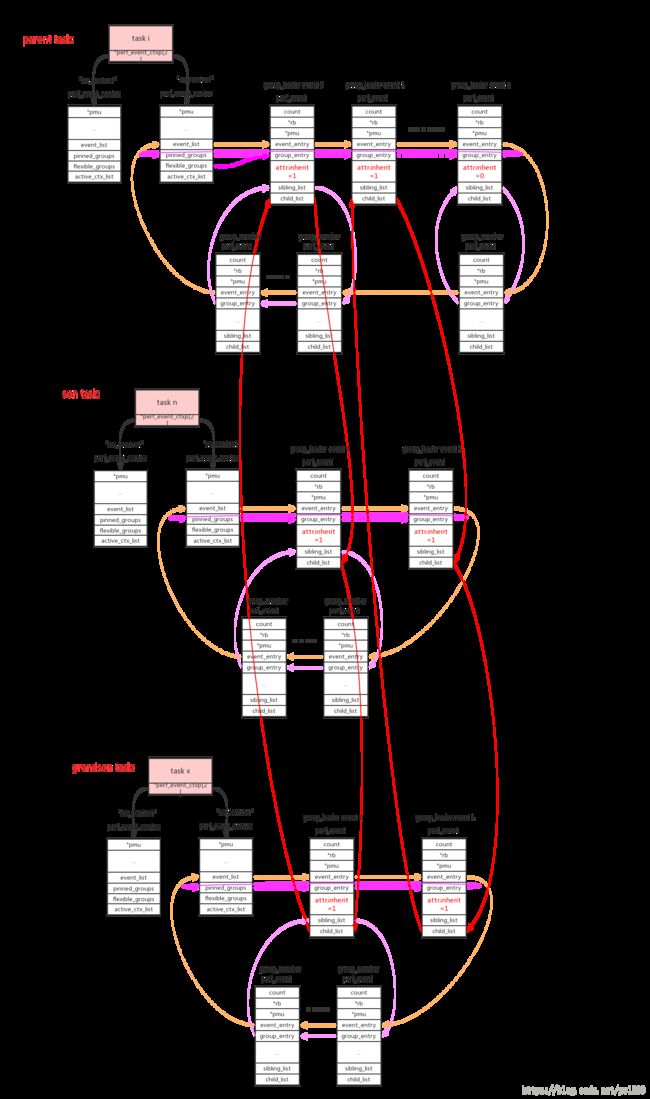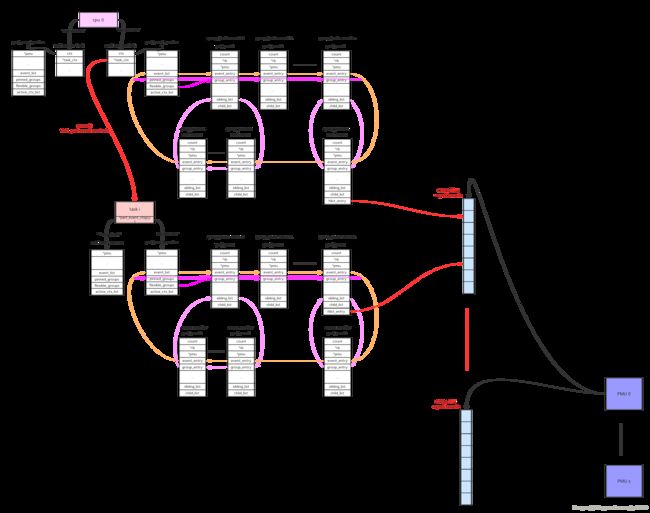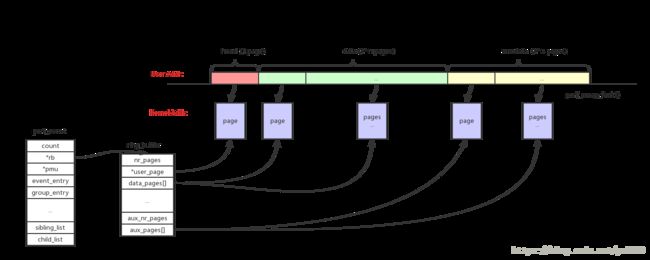Linux perf 1.1、perf_event内核框架
为什么有了ftrace又出来一个perf?因为ftrace只管抓trace数据并没有分析,perf在trace数据分析方面做出了很多成果。
在trace数据采集方面,perf复用了ftrace的所有插桩点,并且加入了采样法(硬件PMU)。PMU是一种非常重要的数据采集方法,因为它大部分是硬件的,所以可以做到一些软件做不到的事情,获取到一些底层硬件的信息。
perf的基本包装模型是这样的,对每一个event分配一个对应的perf_event结构。所有对event的操作都是围绕perf_event来展开的:
- 通过perf_event_open系统调用分配到perf_event以后,会返回一个文件句柄fd,这样这个perf_event结构可以通过read/write/ioctl/mmap通用文件接口来操作。
- perf_event提供两种类型的trace数据:count和sample。count只是记录了event的发生次数,sample记录了大量信息(比如:IP、ADDR、TID、TIME、CPU、BT)。如果需要使用sample功能,需要给perf_event分配ringbuffer空间,并且把这部分空间通过mmap映射到用户空间。这和定位问题时从粗到细的思路是相符的,首先从counter的比例上找出问题热点在哪个模块,再使用详细记录抓取更多信息来进一步定位。具体分别对应“perf stat”和“perf record/report”命令。
- perf的开销应该是比ftrace要大的,因为它给每个event都独立一套数据结构perf_event,对应独立的attr和pmu。在数据记录时的开销肯定大于ftrace,但是每个event的ringbuffer是独立的所以也不需要ftrace复杂的ringbuffer操作。perf也有比ftrace开销小的地方,它的sample数据存储的ringbuffer空间会通过mmap映射到到用户态,这样在读取数据的时候就会少一次拷贝。不过perf的设计初衷也不是让成百上千的event同时使用,只会挑出一些event重点debug。
0、perf_event的组织
从上面的描述看per就是一个个perf_event并不复杂,那么复杂在哪里呢?真正的难点在于对event的组织,怎么把全局的event的资源,按照用户的需要分割成cpu维度/task维度。
我们在分析问题的时候,并不是一下子深入到底层event直接来看数据(如果不加区别event记录的是整系统的数据),我们会遵从系统->cpu->进程来分析问题。针对实际的需求,perf使用cpu维度/task维度来组织perf_event。
我们具体来看看perf_event的组织方法:
1、cpu维度:
使用perf_event_context类型的链表来连接本cpu的相关perf_event。这样的链表共有两条(perf_hw_context = 0, perf_sw_context = 1),链表指针存放在per_cpu变量pmu->pmu_cpu_context.ctx中由所有同类型的pmu共享。
2、task维度:
使用perf_event_context类型的链表来连接本task的相关perf_event。这样的链表共有两条(perf_hw_context = 0, perf_sw_context = 1),链表指针存放在task->perf_event_ctxp[ctxn]变量中。
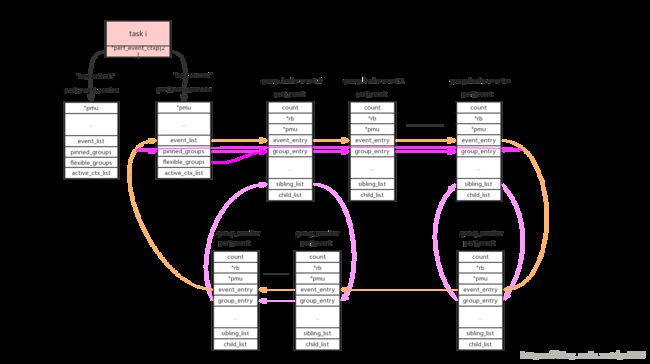
3、perf_event_open()系统调用使用cpu、pid两个参数来指定perf_event的cpu、task维度。
pid == 0: event绑定到当前进程;
pid > 0: event绑定到指定进程;
pid == -1: event绑定到当前cpu的所有进程。
cpu >= 0: event绑定到指定cpu;
cpu == -1: event绑定到所有cpu;在同时指定的情况下task维度优先于cpu维度,所以pid、cpu组合起来有以下几种情况:
组合1:pid >= 0, cpu >= 0。perf_event绑定到task维度的context。task在得到cpu调度运行的时候,context上挂载的本task相关的perf_event也开始运行。但是如果event指定的cpu不等于当前运行的cpu,event不会得到执行,这样就符合了这个组合的含义;
组合2:pid >= 0, cpu == -1。perf_event绑定到task维度的context。只要task得到调度,该perf_event就会得到执行;
组合3:pid == -1, cpu >= 0。perf_event绑定到cpu维度的context。只要该cpu运行,该perf_event就会得到执行。目前只有在cpu online的情况下才能绑定perf_event,cpu hotplug支持可能会有问题;
组合4:pid == -1, cpu == -1。这种组合目前是非法的,相当于整系统所有cpu、所有进程。4、group leader:
cpu/task context使用->event_list链表来连接所有的perf_event。这些perf_event还允许以group的形式来组织,context使用->pinned_groups/flexible_groups链表来连接group leader的perf_event;group leader使用->sibling_list链表来连接所有的group member perf_event。组织形式参考上图。
group的作用是在read count的时候可以一次性读出group中所有perf_event的count。
perf_event_open()系统调用使用group_fd参数来指定perf_event的group_leader:>=0指定对于的perf_event为当前group_leader,== -1创建新的group_leader。
pinned:可以看到group leader被放到两个链表中(->pinned_groups/flexible_groups),attr.pinned=1指定放到高优先级链表->pinned_groups中。
(具体参见后面perf_install_in_context()的代码解析)
5、perf_task_sched。
对于cpu维度的perf_event来说只要cpu online会一直运行,而对于task维度的perf_event来说只有在task得到调度运行的时候event才能运行。所以在每个cpu上同时只能有一个task维度的perf_evnt得到执行,cpu维度的context使用了pmu->pmu_cpu_context->task_ctx指针来保存当前运行的task context。
perf驱动层的精髓就在于此:在合适的时间合适的开关对应的perf_event。(具体参见后面perf_event_task_sched_in()、perf_event_task_sched_out()的代码解析)
在单个cpu上,多个任务调度时context/perf_event的开关情况:
单个任务,在多个cpu上调度时context/perf_event的开关情况:
6、inherit:
inherit属性指定如果perf_event绑定的task创建子进程,event自动的对子进程也进行追踪。这在实际使用时是非常有用的,我们追踪一个app,随后它创建出的子进程/线程都能自动的被追踪。
父进程中所有attr.inherit=1的event被子进程所继承和复制,在使用PERF_FORMAT_GROUP读event的count值时,会把inherit所有子进程的值累加进来。(具体参见后面perf_event_init_task()、perf_read_group()的代码解析)
7、exclusive:
如果pmu有PERF_PMU_CAP_EXCLUSIVE属性,表明它要么只能被绑定为cpu维度、要么只能被绑定为task维度,不能混合绑定。(具体参见后面exclusive_event_init()的代码解析)
8、pmu的数据供给:
每个pmu拥有一个per_cpu的链表,perf_event需要在哪个cpu上获取数据就加入到哪个cpu的链表上。如果event被触发,它会根据当前的运行cpu给对应链表上的所有perf_event推送数据。
cpu维度的context:this_cpu_ptr(pmu->pmu_cpu_context->ctx)上链接的所有perf_event会根据绑定的pmu,链接到pmu对应的per_cpu的->perf_events链表上。
task维度的context:this_cpu_ptr(pmu->pmu_cpu_context->task_ctx)上链接的所有perf_event会根据绑定的pmu,链接到pmu对应的per_cpu的->perf_events链表上。perf_event还需要做cpu匹配,符合(event->cpu == -1 || event->cpu == smp_processor_id())条件的event才能链接到pmu上。9、enable_on_exec:
perf_event的状态(event->state)典型值有以下3种:
disable:PERF_EVENT_STATE_OFF = -1, // 如果attr.disabled = 1,event->state的初始值
enable/inactive:PERF_EVENT_STATE_INACTIVE = 0, // 如果attr.disabled = 0,event->state的初始值
active:PERF_EVENT_STATE_ACTIVE = 1,attr.disabled属性决定了perf_event的初始化状态(disable/enable)。只有perf_event为enable以后才能参与schedule,在schedule过程中perf_event被使能时为active,关闭后恢复成enbale/inactive状态。
perf_event变成enable状态有3种方法:
1、attr.disabled = 0;
2、attr.disabled = 1,创建后使用ioctl的PERF_EVENT_IOC_ENABLE命令来使能;
3、attr.disabled = 1,attr.enable_on_exec = 1。这样使用execl执行新程序时使能event,这是一种非常巧妙的同步手段;10、ringbuffer:
如果需要读取perf_event的sample类型的数据,需要先给perf_event分配一个对应的ringbuffer,为了减少开销这个ringbuffer会被mmap映射成用户态地址。
如上图所示整个ringbuffer空间分成3部分:
head:size = 1 page。主要用来存储控制数据,指针等等
data:size = 2^n pages。主要用来存储perf_event的sample数据
aux data:size = 2^n pages。作用暂时没有看明白如果perf_event支持inherit属性,那么它所有的子进程上继承的perf_event的sample数据,都会保存到父perf_event的ringbuffer中。perf_event可以inherit,但是ringbuffer不会重新分配,会共用父event的ringbuffer。
11、sample_period/sample_freq:
1、perf_event初始化
perf_event初始化的时候将各种pmu注册到pmus链表。
start_kernel() -> perf_event_init():
void __init perf_event_init(void)
{
int ret;
/* (1) 初始化idr,给动态type的pmu来分配 */
idr_init(&pmu_idr);
/* (2) 初始化per_cpu变量swevent_htable */
perf_event_init_all_cpus();
init_srcu_struct(&pmus_srcu);
/* (3) 注册"software" pmu */
perf_pmu_register(&perf_swevent, "software", PERF_TYPE_SOFTWARE);
perf_pmu_register(&perf_cpu_clock, NULL, -1);
perf_pmu_register(&perf_task_clock, NULL, -1);
/* (4) 注册"tracepoint" pmu */
perf_tp_register();
perf_cpu_notifier(perf_cpu_notify);
idle_notifier_register(&perf_event_idle_nb);
register_reboot_notifier(&perf_reboot_notifier);
/* (5) 注册"breakpoint" pmu */
ret = init_hw_breakpoint();
WARN(ret, "hw_breakpoint initialization failed with: %d", ret);
/* do not patch jump label more than once per second */
jump_label_rate_limit(&perf_sched_events, HZ);
/*
* Build time assertion that we keep the data_head at the intended
* location. IOW, validation we got the __reserved[] size right.
*/
BUILD_BUG_ON((offsetof(struct perf_event_mmap_page, data_head))
!= 1024);
}
↓
int perf_pmu_register(struct pmu *pmu, const char *name, int type)
{
int cpu, ret;
mutex_lock(&pmus_lock);
ret = -ENOMEM;
pmu->pmu_disable_count = alloc_percpu(int);
if (!pmu->pmu_disable_count)
goto unlock;
/* (3.1) 如果name = null,则pmu->name=null、pmu->type=-1 */
pmu->type = -1;
if (!name)
goto skip_type;
/* (3.1.1) pmu->name = name */
pmu->name = name;
/* (3.1.2) 如果type < 0,在idr中动态分配值给pmu->type */
if (type < 0) {
type = idr_alloc(&pmu_idr, pmu, PERF_TYPE_MAX, 0, GFP_KERNEL);
if (type < 0) {
ret = type;
goto free_pdc;
}
}
pmu->type = type;
if (pmu_bus_running) {
ret = pmu_dev_alloc(pmu);
if (ret)
goto free_idr;
}
/* (3.2) 初始化cpu维度的perf_cpu_context,
perf_cpu_context的作用是用来把某一维度的perf_event链接到一起
*/
skip_type:
/* (3.2.1) 如果有相同task_ctx_nr类型的pmu已经创建perf_cpu_context结构,
直接引用
*/
pmu->pmu_cpu_context = find_pmu_context(pmu->task_ctx_nr);
if (pmu->pmu_cpu_context)
goto got_cpu_context;
ret = -ENOMEM;
/* (3.2.2) 如果没有人创建本pmu task_ctx_nr类型的perf_cpu_context结构,
重新创建
*/
pmu->pmu_cpu_context = alloc_percpu(struct perf_cpu_context);
if (!pmu->pmu_cpu_context)
goto free_dev;
/* (3.2.3) 初始化per_cpu的perf_cpu_context结构 */
for_each_possible_cpu(cpu) {
struct perf_cpu_context *cpuctx;
cpuctx = per_cpu_ptr(pmu->pmu_cpu_context, cpu);
__perf_event_init_context(&cpuctx->ctx);
lockdep_set_class(&cpuctx->ctx.mutex, &cpuctx_mutex);
lockdep_set_class(&cpuctx->ctx.lock, &cpuctx_lock);
cpuctx->ctx.pmu = pmu;
__perf_mux_hrtimer_init(cpuctx, cpu);
cpuctx->unique_pmu = pmu;
}
got_cpu_context:
/* (3.3) 给pmu赋值一些默认的操作函数 */
if (!pmu->start_txn) {
if (pmu->pmu_enable) {
/*
* If we have pmu_enable/pmu_disable calls, install
* transaction stubs that use that to try and batch
* hardware accesses.
*/
pmu->start_txn = perf_pmu_start_txn;
pmu->commit_txn = perf_pmu_commit_txn;
pmu->cancel_txn = perf_pmu_cancel_txn;
} else {
pmu->start_txn = perf_pmu_nop_txn;
pmu->commit_txn = perf_pmu_nop_int;
pmu->cancel_txn = perf_pmu_nop_void;
}
}
if (!pmu->pmu_enable) {
pmu->pmu_enable = perf_pmu_nop_void;
pmu->pmu_disable = perf_pmu_nop_void;
}
if (!pmu->event_idx)
pmu->event_idx = perf_event_idx_default;
/* (3.4) 最重要的一步:将新的pmu加入到pmus链表中 */
list_add_rcu(&pmu->entry, &pmus);
atomic_set(&pmu->exclusive_cnt, 0);
ret = 0;
unlock:
mutex_unlock(&pmus_lock);
return ret;
free_dev:
device_del(pmu->dev);
put_device(pmu->dev);
free_idr:
if (pmu->type >= PERF_TYPE_MAX)
idr_remove(&pmu_idr, pmu->type);
free_pdc:
free_percpu(pmu->pmu_disable_count);
goto unlock;
}
另外一个函数perf_event_sysfs_init()会在稍后的device_initcall中,为所有“pmu->name != null”的pmu创建对应的device:
static int __init perf_event_sysfs_init(void)
{
struct pmu *pmu;
int ret;
mutex_lock(&pmus_lock);
/* (1) 注册pmu_bus */
ret = bus_register(&pmu_bus);
if (ret)
goto unlock;
/* (2) 遍历pmus链表,创建pmu对应的device */
list_for_each_entry(pmu, &pmus, entry) {
/* 如果pmu->name = null或者pmu->type < 0,不创建 */
if (!pmu->name || pmu->type < 0)
continue;
ret = pmu_dev_alloc(pmu);
WARN(ret, "Failed to register pmu: %s, reason %d\n", pmu->name, ret);
}
/* (3) 设置pmu_bus_running */
pmu_bus_running = 1;
ret = 0;
unlock:
mutex_unlock(&pmus_lock);
return ret;
}
device_initcall(perf_event_sysfs_init);可以在/sys路径下看到对应的device:
# ls /sys/bus/event_source/devices/
armv8_pmuv3 software tracepoint2、perf_event_open系统调用
perf_event_open会创建event对应的perf_event结构,按照perf_event_attr参数把perf_event和对应的pmu以及perf_cpu_context(cpu维度/task维度)绑定,最后再把perf_event和perf_fops以及fd绑定,返回fd给系统进行文件操作。
理解perf_event_open系统调用先理解它的5个参数:
perf_event_open(struct perf_event_attr attr, pid_t pid, int cpu, int group_fd, unsigned long flags)- 参数1、struct perf_event_attr attr。该参数是最复杂也是最重要的参数:
struct perf_event_attr {
/*
* Major type: hardware/software/tracepoint/etc.
*/
/* (1) 指定pmu的type:
enum perf_type_id {
PERF_TYPE_HARDWARE = 0,
PERF_TYPE_SOFTWARE = 1,
PERF_TYPE_TRACEPOINT = 2,
PERF_TYPE_HW_CACHE = 3,
PERF_TYPE_RAW = 4,
PERF_TYPE_BREAKPOINT = 5,
PERF_TYPE_MAX,
};
*/
__u32 type;
/*
* Size of the attr structure, for fwd/bwd compat.
*/
/* (2) 整个perf_event_attr结构体的size */
__u32 size;
/*
* Type specific configuration information.
*/
/* (3) 不同type的pmu,config的含义也不同:
1、type = PERF_TYPE_HARDWARE:
enum perf_hw_id {
PERF_COUNT_HW_CPU_CYCLES = 0,
PERF_COUNT_HW_INSTRUCTIONS = 1,
PERF_COUNT_HW_CACHE_REFERENCES = 2,
PERF_COUNT_HW_CACHE_MISSES = 3,
PERF_COUNT_HW_BRANCH_INSTRUCTIONS = 4,
PERF_COUNT_HW_BRANCH_MISSES = 5,
PERF_COUNT_HW_BUS_CYCLES = 6,
PERF_COUNT_HW_STALLED_CYCLES_FRONTEND = 7,
PERF_COUNT_HW_STALLED_CYCLES_BACKEND = 8,
PERF_COUNT_HW_REF_CPU_CYCLES = 9,
PERF_COUNT_HW_MAX,
};
2、type = PERF_TYPE_SOFTWARE:
enum perf_sw_ids {
PERF_COUNT_SW_CPU_CLOCK = 0,
PERF_COUNT_SW_TASK_CLOCK = 1,
PERF_COUNT_SW_PAGE_FAULTS = 2,
PERF_COUNT_SW_CONTEXT_SWITCHES = 3,
PERF_COUNT_SW_CPU_MIGRATIONS = 4,
PERF_COUNT_SW_PAGE_FAULTS_MIN = 5,
PERF_COUNT_SW_PAGE_FAULTS_MAJ = 6,
PERF_COUNT_SW_ALIGNMENT_FAULTS = 7,
PERF_COUNT_SW_EMULATION_FAULTS = 8,
PERF_COUNT_SW_DUMMY = 9,
PERF_COUNT_SW_BPF_OUTPUT = 10,
PERF_COUNT_SW_MAX,
};
3、type = PERF_TYPE_TRACEPOINT:
trace_point对应trace_event的id:“/sys/kernel/debug/tracing/events/x/x/id”
4、type = PERF_TYPE_HW_CACHE:
enum perf_hw_cache_id {
PERF_COUNT_HW_CACHE_L1D = 0,
PERF_COUNT_HW_CACHE_L1I = 1,
PERF_COUNT_HW_CACHE_LL = 2,
PERF_COUNT_HW_CACHE_DTLB = 3,
PERF_COUNT_HW_CACHE_ITLB = 4,
PERF_COUNT_HW_CACHE_BPU = 5,
PERF_COUNT_HW_CACHE_NODE = 6,
PERF_COUNT_HW_CACHE_MAX,
};
*/
__u64 config;
/* (4) period/freq sample模式的具体数值 */
union {
__u64 sample_period;
__u64 sample_freq;
};
/* (5) 在sample数据时,需要保存哪些数据:
enum perf_event_sample_format {
PERF_SAMPLE_IP = 1U << 0,
PERF_SAMPLE_TID = 1U << 1,
PERF_SAMPLE_TIME = 1U << 2,
PERF_SAMPLE_ADDR = 1U << 3,
PERF_SAMPLE_READ = 1U << 4,
PERF_SAMPLE_CALLCHAIN = 1U << 5,
PERF_SAMPLE_ID = 1U << 6,
PERF_SAMPLE_CPU = 1U << 7,
PERF_SAMPLE_PERIOD = 1U << 8,
PERF_SAMPLE_STREAM_ID = 1U << 9,
PERF_SAMPLE_RAW = 1U << 10,
PERF_SAMPLE_BRANCH_STACK = 1U << 11,
PERF_SAMPLE_REGS_USER = 1U << 12,
PERF_SAMPLE_STACK_USER = 1U << 13,
PERF_SAMPLE_WEIGHT = 1U << 14,
PERF_SAMPLE_DATA_SRC = 1U << 15,
PERF_SAMPLE_IDENTIFIER = 1U << 16,
PERF_SAMPLE_TRANSACTION = 1U << 17,
PERF_SAMPLE_REGS_INTR = 1U << 18,
PERF_SAMPLE_MAX = 1U << 19,
};
*/
__u64 sample_type;
/* (6) 在read counter数据时,读取的格式:
*
* The format of the data returned by read() on a perf event fd,
* as specified by attr.read_format:
*
* struct read_format {
* { u64 value;
* { u64 time_enabled; } && PERF_FORMAT_TOTAL_TIME_ENABLED
* { u64 time_running; } && PERF_FORMAT_TOTAL_TIME_RUNNING
* { u64 id; } && PERF_FORMAT_ID
* } && !PERF_FORMAT_GROUP
*
* { u64 nr;
* { u64 time_enabled; } && PERF_FORMAT_TOTAL_TIME_ENABLED
* { u64 time_running; } && PERF_FORMAT_TOTAL_TIME_RUNNING
* { u64 value;
* { u64 id; } && PERF_FORMAT_ID
* } cntr[nr];
* } && PERF_FORMAT_GROUP
* };
*
enum perf_event_read_format {
PERF_FORMAT_TOTAL_TIME_ENABLED = 1U << 0,
PERF_FORMAT_TOTAL_TIME_RUNNING = 1U << 1,
PERF_FORMAT_ID = 1U << 2,
PERF_FORMAT_GROUP = 1U << 3,
PERF_FORMAT_MAX = 1U << 4,
};
*/
__u64 read_format;
/* (7) bit标志 */
/* (7.1) 定义event的初始状态为disable/enable。
如果初始被disable,后续可以通过ioctl/prctl来enable。
*/
__u64 disabled : 1, /* off by default */
/* (7.2) 如果该标志被设置,event进程对应的子孙后代的子进程都会计入counter */
inherit : 1, /* children inherit it */
/* (7.3) 如果该标志被设置,event和cpu绑定。(只适用于硬件counter只适用于group leaders) */
pinned : 1, /* must always be on PMU */
/* (7.4) 如果该标志被设置,指定当这个group在CPU上时,它应该是唯一使用CPU计数器的group */
exclusive : 1, /* only group on PMU */
/* (7.5) exclude_user/exclude_kernel/exclude_hv/exclude_idle这几个标志用来标识,
不要记录对应场景的数据
*/
exclude_user : 1, /* don't count user */
exclude_kernel : 1, /* ditto kernel */
exclude_hv : 1, /* ditto hypervisor */
exclude_idle : 1, /* don't count when idle */
/* (7.6) 允许记录PROT_EXEC mmap操作 */
mmap : 1, /* include mmap data */
/* (7.7) 允许记录进程创建时的comm数据 */
comm : 1, /* include comm data */
/* (7.8) 确定sample模式 = freq/period */
freq : 1, /* use freq, not period */
inherit_stat : 1, /* per task counts */
enable_on_exec : 1, /* next exec enables */
task : 1, /* trace fork/exit */
watermark : 1, /* wakeup_watermark */
/*
* precise_ip:
*
* 0 - SAMPLE_IP can have arbitrary skid
* 1 - SAMPLE_IP must have constant skid
* 2 - SAMPLE_IP requested to have 0 skid
* 3 - SAMPLE_IP must have 0 skid
*
* See also PERF_RECORD_MISC_EXACT_IP
*/
precise_ip : 2, /* skid constraint */
mmap_data : 1, /* non-exec mmap data */
sample_id_all : 1, /* sample_type all events */
exclude_host : 1, /* don't count in host */
exclude_guest : 1, /* don't count in guest */
exclude_callchain_kernel : 1, /* exclude kernel callchains */
exclude_callchain_user : 1, /* exclude user callchains */
mmap2 : 1, /* include mmap with inode data */
comm_exec : 1, /* flag comm events that are due to an exec */
use_clockid : 1, /* use @clockid for time fields */
context_switch : 1, /* context switch data */
constraint_duplicate : 1,
__reserved_1 : 36;
union {
__u32 wakeup_events; /* wakeup every n events */
__u32 wakeup_watermark; /* bytes before wakeup */
};
__u32 bp_type;
union {
__u64 bp_addr;
__u64 config1; /* extension of config */
};
union {
__u64 bp_len;
__u64 config2; /* extension of config1 */
};
__u64 branch_sample_type; /* enum perf_branch_sample_type */
/*
* Defines set of user regs to dump on samples.
* See asm/perf_regs.h for details.
*/
__u64 sample_regs_user;
/*
* Defines size of the user stack to dump on samples.
*/
__u32 sample_stack_user;
__s32 clockid;
/*
* Defines set of regs to dump for each sample
* state captured on:
* - precise = 0: PMU interrupt
* - precise > 0: sampled instruction
*
* See asm/perf_regs.h for details.
*/
__u64 sample_regs_intr;
/*
* Wakeup watermark for AUX area
*/
__u32 aux_watermark;
__u32 __reserved_2; /* align to __u64 */
}参数2、pid_t pid:
pid == 0: event绑定到当前进程;
pid > 0: event绑定到指定进程;
pid < 0: event绑定到当前cpu的所有进程。参数3、int cpu:
cpu >= 0: event绑定到指定cpu;
cpu == -1: event绑定到所有cpu;
(注意’pid == -1’、’cpu == -1’同时存在是非法的)参数4、int group_fd:
group_fd = -1:创建一个新的group leader;
group_fd > 0:加入到之前创建的group leader中。参数5、unsigned long flags:
#define PERF_FLAG_FD_NO_GROUP (1UL << 0)
#define PERF_FLAG_FD_OUTPUT (1UL << 1)
#define PERF_FLAG_PID_CGROUP (1UL << 2) /* pid=cgroup id, per-cpu mode only */
#define PERF_FLAG_FD_CLOEXEC (1UL << 3) /* O_CLOEXEC */perf_event_open()函数的完全解析如下:
SYSCALL_DEFINE5(perf_event_open,
struct perf_event_attr __user *, attr_uptr,
pid_t, pid, int, cpu, int, group_fd, unsigned long, flags)
{
struct perf_event *group_leader = NULL, *output_event = NULL;
struct perf_event *event, *sibling;
struct perf_event_attr attr;
struct perf_event_context *ctx, *uninitialized_var(gctx);
struct file *event_file = NULL;
struct fd group = {NULL, 0};
struct task_struct *task = NULL;
struct pmu *pmu;
int event_fd;
int move_group = 0;
int err;
int f_flags = O_RDWR;
int cgroup_fd = -1;
/* (1) 一系列的合法性判断和准备工作 */
/* for future expandability... */
if (flags & ~PERF_FLAG_ALL)
return -EINVAL;
/* (1.1) 权限判断 */
if (perf_paranoid_any() && !capable(CAP_SYS_ADMIN))
return -EACCES;
/* (1.2) 拷贝用户态的perf_event_attr到内核态 */
err = perf_copy_attr(attr_uptr, &attr);
if (err)
return err;
if (attr.constraint_duplicate || attr.__reserved_1)
return -EINVAL;
if (!attr.exclude_kernel) {
if (perf_paranoid_kernel() && !capable(CAP_SYS_ADMIN))
return -EACCES;
}
/* (1.3) 如果sample是freq mode,sample_freq的合法性判断 */
if (attr.freq) {
if (attr.sample_freq > sysctl_perf_event_sample_rate)
return -EINVAL;
/* (1.4) 如果sample是period mode,sample_period的合法性判断 */
} else {
if (attr.sample_period & (1ULL << 63))
return -EINVAL;
}
/*
* In cgroup mode, the pid argument is used to pass the fd
* opened to the cgroup directory in cgroupfs. The cpu argument
* designates the cpu on which to monitor threads from that
* cgroup.
*/
if ((flags & PERF_FLAG_PID_CGROUP) && (pid == -1 || cpu == -1))
return -EINVAL;
if (flags & PERF_FLAG_FD_CLOEXEC)
f_flags |= O_CLOEXEC;
/* (1.5) 当前进程获取一个新的fd编号 */
event_fd = get_unused_fd_flags(f_flags);
if (event_fd < 0)
return event_fd;
/* (1.6) 如果当前event需要加入到指定的group leader中,获取到:
group_fd对应的fd结构 和 perf_event结构
*/
if (group_fd != -1) {
err = perf_fget_light(group_fd, &group);
if (err)
goto err_fd;
group_leader = group.file->private_data;
if (flags & PERF_FLAG_FD_OUTPUT)
output_event = group_leader;
if (flags & PERF_FLAG_FD_NO_GROUP)
group_leader = NULL;
}
/*
* Take the group_leader's group_leader_mutex before observing
* anything in the group leader that leads to changes in ctx,
* many of which may be changing on another thread.
* In particular, we want to take this lock before deciding
* whether we need to move_group.
*/
if (group_leader)
mutex_lock(&group_leader->group_leader_mutex);
/* (1.7) 找到pid对应的task_struct结构 */
if (pid != -1 && !(flags & PERF_FLAG_PID_CGROUP)) {
task = find_lively_task_by_vpid(pid);
if (IS_ERR(task)) {
err = PTR_ERR(task);
goto err_group_fd;
}
}
/* (1.8) 如果是加入到group leader,需要两者的attr.inherit属性一致 */
if (task && group_leader &&
group_leader->attr.inherit != attr.inherit) {
err = -EINVAL;
goto err_task;
}
get_online_cpus();
if (task) {
err = mutex_lock_interruptible(&task->signal->cred_guard_mutex);
if (err)
goto err_cpus;
/*
* Reuse ptrace permission checks for now.
*
* We must hold cred_guard_mutex across this and any potential
* perf_install_in_context() call for this new event to
* serialize against exec() altering our credentials (and the
* perf_event_exit_task() that could imply).
*/
err = -EACCES;
if (!ptrace_may_access(task, PTRACE_MODE_READ_REALCREDS))
goto err_cred;
}
/* (1.9) 创建cgroup fd,这和之前的group leader不一样 */
if (flags & PERF_FLAG_PID_CGROUP)
cgroup_fd = pid;
/* (2) 重头戏:根据传入的参数,分配perf_event结构并初始化 */
event = perf_event_alloc(&attr, cpu, task, group_leader, NULL,
NULL, NULL, cgroup_fd);
if (IS_ERR(event)) {
err = PTR_ERR(event);
goto err_cred;
}
/* (3.1) 如果attr指定需要sample数据,但是pmu没有中断能力,返回出错(主要是针对硬件pmu) */
if (is_sampling_event(event)) {
if (event->pmu->capabilities & PERF_PMU_CAP_NO_INTERRUPT) {
err = -ENOTSUPP;
goto err_alloc;
}
}
/*
* Special case software events and allow them to be part of
* any hardware group.
*/
pmu = event->pmu;
/* (3.2) 如果用户指定时钟源,把event->clock设置为用户指定值 */
if (attr.use_clockid) {
err = perf_event_set_clock(event, attr.clockid);
if (err)
goto err_alloc;
}
/* (3.3) 如果event和group_leader的pmu type不一致的处理 */
if (group_leader &&
(is_software_event(event) != is_software_event(group_leader))) {
/* (3.3.1) pmu type: event == software, group_leader != software
把event加入到group_leader中
*/
if (is_software_event(event)) {
/*
* If event and group_leader are not both a software
* event, and event is, then group leader is not.
*
* Allow the addition of software events to !software
* groups, this is safe because software events never
* fail to schedule.
*/
pmu = group_leader->pmu;
/* (3.3.2) pmu type: event != software, group_leader == software
尝试把整个group移入到hardware context中
*/
} else if (is_software_event(group_leader) &&
(group_leader->group_flags & PERF_GROUP_SOFTWARE)) {
/*
* In case the group is a pure software group, and we
* try to add a hardware event, move the whole group to
* the hardware context.
*/
move_group = 1;
}
}
/*
* Get the target context (task or percpu):
*/
/* (4) get到perf_event_context,根据perf_event类型得到cpu维度/task维度的context:
如果pid=-1即task=NULL,获得cpu维度的context,即pmu注册时根据pmu->task_ctx_nr分配的pmu->pmu_cpu_context->ctx
如果pid>=0即task!=NULL,获得task维度的context,即task->perf_event_ctxp[ctxn],如果为空则重新创建
*/
ctx = find_get_context(pmu, task, event);
if (IS_ERR(ctx)) {
err = PTR_ERR(ctx);
goto err_alloc;
}
/* (5.1) event需要加入到group_leader,如果(pmu->capabilities & PERF_PMU_CAP_EXCLUSIVE),出错返回 */
if ((pmu->capabilities & PERF_PMU_CAP_EXCLUSIVE) && group_leader) {
err = -EBUSY;
goto err_context;
}
/*
* Look up the group leader (we will attach this event to it):
*/
/* (5.2) event需要加入到group_leader,对一些条件进行合法性判断 */
if (group_leader) {
err = -EINVAL;
/*
* Do not allow a recursive hierarchy (this new sibling
* becoming part of another group-sibling):
*/
/* (5.2.1) 不允许递归的->group_leader */
if (group_leader->group_leader != group_leader)
goto err_context;
/* All events in a group should have the same clock */
/* (5.2.2) event加入gruop,需要时钟源一致 */
if (group_leader->clock != event->clock)
goto err_context;
/*
* Do not allow to attach to a group in a different
* task or CPU context:
*/
/* (5.2.3) event加入gruop,需要task/cpu的context一致 */
if (move_group) {
/*
* Make sure we're both on the same task, or both
* per-cpu events.
*/
if (group_leader->ctx->task != ctx->task)
goto err_context;
/*
* Make sure we're both events for the same CPU;
* grouping events for different CPUs is broken; since
* you can never concurrently schedule them anyhow.
*/
if (group_leader->cpu != event->cpu)
goto err_context;
} else {
if (group_leader->ctx != ctx)
goto err_context;
}
/*
* Only a group leader can be exclusive or pinned
*/
/* (5.2.4) 只有group才能设置exclusive/pinned属性 */
if (attr.exclusive || attr.pinned)
goto err_context;
}
/* (5.3) 设置output_event */
if (output_event) {
err = perf_event_set_output(event, output_event);
if (err)
goto err_context;
}
/* (6) 分配perf_event对应的file结构:
file->private_data = event; // file和event结构链接在一起
file->f_op = perf_fops; // file的文件操作函数集
后续会把fd和file链接到一起:fd_install(event_fd, event_file);
*/
event_file = anon_inode_getfile("[perf_event]", &perf_fops, event,
f_flags);
if (IS_ERR(event_file)) {
err = PTR_ERR(event_file);
event_file = NULL;
goto err_context;
}
if (move_group) {
gctx = group_leader->ctx;
mutex_lock_double(&gctx->mutex, &ctx->mutex);
} else {
mutex_lock(&ctx->mutex);
}
/* (7.1) 根据attr计算:event->read_size、event->header_size、event->id_header_size
并判断是否有超长
*/
if (!perf_event_validate_size(event)) {
err = -E2BIG;
goto err_locked;
}
/*
* Must be under the same ctx::mutex as perf_install_in_context(),
* because we need to serialize with concurrent event creation.
*/
/* (7.2) 如果是排他性event:(pmu->capabilities & PERF_PMU_CAP_EXCLUSIVE)
检查context链表中现有的event是否允许新的event插入
*/
if (!exclusive_event_installable(event, ctx)) {
/* exclusive and group stuff are assumed mutually exclusive */
WARN_ON_ONCE(move_group);
err = -EBUSY;
goto err_locked;
}
WARN_ON_ONCE(ctx->parent_ctx);
/*
* This is the point on no return; we cannot fail hereafter. This is
* where we start modifying current state.
*/
/* (8) 如果group和当前event的pmu type不一致,
尝试更改context到当前event
*/
if (move_group) {
/*
* See perf_event_ctx_lock() for comments on the details
* of swizzling perf_event::ctx.
*/
/* (8.1) 把group_leader从原有的context中remove */
perf_remove_from_context(group_leader, false);
/* (8.2) 把所有group_leader的子event从原有的context中remove */
list_for_each_entry(sibling, &group_leader->sibling_list,
group_entry) {
perf_remove_from_context(sibling, false);
put_ctx(gctx);
}
/*
* Wait for everybody to stop referencing the events through
* the old lists, before installing it on new lists.
*/
synchronize_rcu();
/*
* Install the group siblings before the group leader.
*
* Because a group leader will try and install the entire group
* (through the sibling list, which is still in-tact), we can
* end up with siblings installed in the wrong context.
*
* By installing siblings first we NO-OP because they're not
* reachable through the group lists.
*/
/* (8.3) 把所有group_leader的子event安装到新的context中 */
list_for_each_entry(sibling, &group_leader->sibling_list,
group_entry) {
perf_event__state_init(sibling);
perf_install_in_context(ctx, sibling, sibling->cpu);
get_ctx(ctx);
}
/*
* Removing from the context ends up with disabled
* event. What we want here is event in the initial
* startup state, ready to be add into new context.
*/
/* (8.4) 把group_leader安装到新的context中 */
perf_event__state_init(group_leader);
perf_install_in_context(ctx, group_leader, group_leader->cpu);
get_ctx(ctx);
/*
* Now that all events are installed in @ctx, nothing
* references @gctx anymore, so drop the last reference we have
* on it.
*/
put_ctx(gctx);
}
/*
* Precalculate sample_data sizes; do while holding ctx::mutex such
* that we're serialized against further additions and before
* perf_install_in_context() which is the point the event is active and
* can use these values.
*/
/* (9.1) 重新计算:event->read_size、event->header_size、event->id_header_size */
perf_event__header_size(event);
perf_event__id_header_size(event);
/* (10) 把event安装到context当中 */
perf_install_in_context(ctx, event, event->cpu);
perf_unpin_context(ctx);
if (move_group)
mutex_unlock(&gctx->mutex);
mutex_unlock(&ctx->mutex);
if (group_leader)
mutex_unlock(&group_leader->group_leader_mutex);
if (task) {
mutex_unlock(&task->signal->cred_guard_mutex);
put_task_struct(task);
}
put_online_cpus();
event->owner = current;
/* (9.2) 把当前进程创建的所有event,加入到current->perf_event_list链表中 */
mutex_lock(¤t->perf_event_mutex);
list_add_tail(&event->owner_entry, ¤t->perf_event_list);
mutex_unlock(¤t->perf_event_mutex);
/*
* Drop the reference on the group_event after placing the
* new event on the sibling_list. This ensures destruction
* of the group leader will find the pointer to itself in
* perf_group_detach().
*/
fdput(group);
/* (9.3) 把fd和file进行链接 */
fd_install(event_fd, event_file);
return event_fd;
err_locked:
if (move_group)
mutex_unlock(&gctx->mutex);
mutex_unlock(&ctx->mutex);
/* err_file: */
fput(event_file);
err_context:
perf_unpin_context(ctx);
put_ctx(ctx);
err_alloc:
/*
* If event_file is set, the fput() above will have called ->release()
* and that will take care of freeing the event.
*/
if (!event_file)
free_event(event);
err_cred:
if (task)
mutex_unlock(&task->signal->cred_guard_mutex);
err_cpus:
put_online_cpus();
err_task:
if (task)
put_task_struct(task);
err_group_fd:
if (group_leader)
mutex_unlock(&group_leader->group_leader_mutex);
fdput(group);
err_fd:
put_unused_fd(event_fd);
return err;
}
|→
static struct perf_event *
perf_event_alloc(struct perf_event_attr *attr, int cpu,
struct task_struct *task,
struct perf_event *group_leader,
struct perf_event *parent_event,
perf_overflow_handler_t overflow_handler,
void *context, int cgroup_fd)
{
struct pmu *pmu;
struct perf_event *event;
struct hw_perf_event *hwc;
long err = -EINVAL;
if ((unsigned)cpu >= nr_cpu_ids) {
if (!task || cpu != -1)
return ERR_PTR(-EINVAL);
}
/* (2.1) 分配perf_event空间 */
event = kzalloc(sizeof(*event), GFP_KERNEL);
if (!event)
return ERR_PTR(-ENOMEM);
/*
* Single events are their own group leaders, with an
* empty sibling list:
*
/* (2.2) 如果group_fd == -1,那么group_leader = self */
if (!group_leader)
group_leader = event;
mutex_init(&event->group_leader_mutex);
mutex_init(&event->child_mutex);
INIT_LIST_HEAD(&event->child_list);
INIT_LIST_HEAD(&event->group_entry);
INIT_LIST_HEAD(&event->event_entry);
INIT_LIST_HEAD(&event->sibling_list);
INIT_LIST_HEAD(&event->rb_entry);
INIT_LIST_HEAD(&event->active_entry);
INIT_LIST_HEAD(&event->drv_configs);
INIT_HLIST_NODE(&event->hlist_entry);
init_waitqueue_head(&event->waitq);
init_irq_work(&event->pending, perf_pending_event);
mutex_init(&event->mmap_mutex);
atomic_long_set(&event->refcount, 1);
event->cpu = cpu;
event->attr = *attr;
event->group_leader = group_leader;
event->pmu = NULL;
event->oncpu = -1;
event->parent = parent_event;
event->ns = get_pid_ns(task_active_pid_ns(current));
event->id = atomic64_inc_return(&perf_event_id);
event->state = PERF_EVENT_STATE_INACTIVE;
/* (2.3) 如果task != null */
if (task) {
event->attach_state = PERF_ATTACH_TASK;
/*
* XXX pmu::event_init needs to know what task to account to
* and we cannot use the ctx information because we need the
* pmu before we get a ctx.
*/
event->hw.target = task;
}
event->clock = &local_clock;
if (parent_event)
event->clock = parent_event->clock;
if (!overflow_handler && parent_event) {
overflow_handler = parent_event->overflow_handler;
context = parent_event->overflow_handler_context;
}
event->overflow_handler = overflow_handler;
event->overflow_handler_context = context;
/* (2.4) 根据attr.disabled的值来设置event的初始化值:
event->state = PERF_EVENT_STATE_OFF/PERF_EVENT_STATE_INACTIVE
*/
perf_event__state_init(event);
pmu = NULL;
/* (2.5) 根据event的attr->freq和attr->sample_period/sample_freq来初始化event->hw:
hwc->sample_period
hwc->last_period
hwc->period_left
*/
hwc = &event->hw;
hwc->sample_period = attr->sample_period;
if (attr->freq && attr->sample_freq)
hwc->sample_period = 1;
hwc->last_period = hwc->sample_period;
local64_set(&hwc->period_left, hwc->sample_period);
/*
* we currently do not support PERF_FORMAT_GROUP on inherited events
*/
/* (2.6) inherit时不支持PERF_FORMAT_GROUP */
if (attr->inherit && (attr->read_format & PERF_FORMAT_GROUP))
goto err_ns;
/* (2.7) 如果!(attr.sample_type & PERF_SAMPLE_BRANCH_STACK):
则attr.branch_sample_type = 0
*/
if (!has_branch_stack(event))
event->attr.branch_sample_type = 0;
/* (2.8) 如果(flags & PERF_FLAG_PID_CGROUP):
将当前event加入cgroup
*/
if (cgroup_fd != -1) {
err = perf_cgroup_connect(cgroup_fd, event, attr, group_leader);
if (err)
goto err_ns;
}
/* (2.9) 至关重要的一步:
根据attr.type在pmus链表中找到对应的pmu,
并且调用pmu->event_init(event)来初始化event
*/
pmu = perf_init_event(event);
if (!pmu)
goto err_ns;
else if (IS_ERR(pmu)) {
err = PTR_ERR(pmu);
goto err_ns;
}
/* (2.10) exclusive类型pmu的event的处理 */
err = exclusive_event_init(event);
if (err)
goto err_pmu;
if (!event->parent) {
if (event->attr.sample_type & PERF_SAMPLE_CALLCHAIN) {
err = get_callchain_buffers();
if (err)
goto err_per_task;
}
}
/* symmetric to unaccount_event() in _free_event() */
/* (2.11) 关于event操作的一些统计 */
account_event(event);
return event;
err_per_task:
exclusive_event_destroy(event);
err_pmu:
if (event->destroy)
event->destroy(event);
module_put(pmu->module);
err_ns:
if (is_cgroup_event(event))
perf_detach_cgroup(event);
if (event->ns)
put_pid_ns(event->ns);
kfree(event);
return ERR_PTR(err);
}
|→
static struct perf_event_context *
find_get_context(struct pmu *pmu, struct task_struct *task,
struct perf_event *event)
{
struct perf_event_context *ctx, *clone_ctx = NULL;
struct perf_cpu_context *cpuctx;
void *task_ctx_data = NULL;
unsigned long flags;
int ctxn, err;
int cpu = event->cpu;
/* (4.1) 如果task=null即pid=-1,获取cpu维度的context */
if (!task) {
/* Must be root to operate on a CPU event: */
/* (4.1.1) 权限判断 */
if (event->owner != EVENT_OWNER_KERNEL && perf_paranoid_cpu() &&
!capable(CAP_SYS_ADMIN))
return ERR_PTR(-EACCES);
/*
* We could be clever and allow to attach a event to an
* offline CPU and activate it when the CPU comes up, but
* that's for later.
*/
/* (4.1.2) attr指定的cpu是否online */
if (!cpu_online(cpu))
return ERR_PTR(-ENODEV);
/* (4.1.3) 根据cpu获取到对应pmu的cpu维度context:per_cpu_ptr(pmu->pmu_cpu_context, cpu)->ctx */
cpuctx = per_cpu_ptr(pmu->pmu_cpu_context, cpu);
ctx = &cpuctx->ctx;
get_ctx(ctx);
++ctx->pin_count;
return ctx;
}
/* (4.2) 如果task!=null即pid>=0,获取task维度的context */
err = -EINVAL;
ctxn = pmu->task_ctx_nr;
if (ctxn < 0)
goto errout;
/* (4.2.1) 部分架构context需要分配ctx->task_ctx_data */
if (event->attach_state & PERF_ATTACH_TASK_DATA) {
task_ctx_data = kzalloc(pmu->task_ctx_size, GFP_KERNEL);
if (!task_ctx_data) {
err = -ENOMEM;
goto errout;
}
}
retry:
/* (4.2.2) 获取task维度的context:task->perf_event_ctxp[pmu->task_ctx_nr]
如果此前无人创建过此context,则分配空间创建
*/
ctx = perf_lock_task_context(task, ctxn, &flags);
/* (4.2.2.1) task此context已经创建,则使用现成的 */
if (ctx) {
clone_ctx = unclone_ctx(ctx);
++ctx->pin_count;
if (task_ctx_data && !ctx->task_ctx_data) {
ctx->task_ctx_data = task_ctx_data;
task_ctx_data = NULL;
}
raw_spin_unlock_irqrestore(&ctx->lock, flags);
if (clone_ctx)
put_ctx(clone_ctx);
/* (4.2.2.2) 否则,重新创建task->perf_event_ctxp[pmu->task_ctx_nr] */
} else {
ctx = alloc_perf_context(pmu, task);
err = -ENOMEM;
if (!ctx)
goto errout;
if (task_ctx_data) {
ctx->task_ctx_data = task_ctx_data;
task_ctx_data = NULL;
}
err = 0;
mutex_lock(&task->perf_event_mutex);
/*
* If it has already passed perf_event_exit_task().
* we must see PF_EXITING, it takes this mutex too.
*/
if (task->flags & PF_EXITING)
err = -ESRCH;
else if (task->perf_event_ctxp[ctxn])
err = -EAGAIN;
else {
get_ctx(ctx);
++ctx->pin_count;
rcu_assign_pointer(task->perf_event_ctxp[ctxn], ctx);
}
mutex_unlock(&task->perf_event_mutex);
if (unlikely(err)) {
put_ctx(ctx);
if (err == -EAGAIN)
goto retry;
goto errout;
}
}
kfree(task_ctx_data);
return ctx;
errout:
kfree(task_ctx_data);
return ERR_PTR(err);
}
|→
static void
perf_install_in_context(struct perf_event_context *ctx,
struct perf_event *event,
int cpu)
{
struct task_struct *task = ctx->task;
lockdep_assert_held(&ctx->mutex);
/* (10.1) context赋值给event->ctx */
event->ctx = ctx;
if (event->cpu != -1)
event->cpu = cpu;
/* (10.2) 如果是cpu维度的context,
使用cpu同步机制来调用指定的cpu上运行__perf_install_in_context()
绑定context、event
*/
if (!task) {
/*
* Per cpu events are installed via an smp call and
* the install is always successful.
*/
cpu_function_call(cpu, __perf_install_in_context, event);
return;
}
retry:
/* (10.3) 如果是task维度的context,且task当前正在running
使用cpu同步机制调用指定的task的运行cpu(即task_cpu(p))上运行__perf_install_in_context()
绑定context、event
*/
if (!task_function_call(task, __perf_install_in_context, event))
return;
raw_spin_lock_irq(&ctx->lock);
/*
* If we failed to find a running task, but find the context active now
* that we've acquired the ctx->lock, retry.
*/
if (ctx->is_active) {
raw_spin_unlock_irq(&ctx->lock);
/*
* Reload the task pointer, it might have been changed by
* a concurrent perf_event_context_sched_out().
*/
task = ctx->task;
goto retry;
}
/*
* Since the task isn't running, its safe to add the event, us holding
* the ctx->lock ensures the task won't get scheduled in.
*/
/* (10.4) 如果是task维度的context,但是task当前不在runnning
可以安全的绑定event和context
*/
add_event_to_ctx(event, ctx);
raw_spin_unlock_irq(&ctx->lock);
}
||→
static void add_event_to_ctx(struct perf_event *event,
struct perf_event_context *ctx)
{
u64 tstamp = perf_event_time(event);
/* (10.4.1) 将event加入到context的相关链表 */
list_add_event(event, ctx);
/* (10.4.2) 将event加入到group_leader的链表 */
perf_group_attach(event);
event->tstamp_enabled = tstamp;
event->tstamp_running = tstamp;
event->tstamp_stopped = tstamp;
}
|||→
static void
list_add_event(struct perf_event *event, struct perf_event_context *ctx)
{
WARN_ON_ONCE(event->attach_state & PERF_ATTACH_CONTEXT);
/* (10.4.1.1) 设置event->attach_state的PERF_ATTACH_CONTEXT */
event->attach_state |= PERF_ATTACH_CONTEXT;
/*
* If we're a stand alone event or group leader, we go to the context
* list, group events are kept attached to the group so that
* perf_group_detach can, at all times, locate all siblings.
*/
/* (10.4.1.2) 如果event是group_leader
则将其event->group_entry加入到顶级group链表:ctx->flexible_groups/pinned_groups
ctx->flexible_groups/pinned_groups链表只链接group_leader的event
*/
if (event->group_leader == event) {
struct list_head *list;
if (is_software_event(event))
event->group_flags |= PERF_GROUP_SOFTWARE;
list = ctx_group_list(event, ctx);
list_add_tail(&event->group_entry, list);
}
if (is_cgroup_event(event))
ctx->nr_cgroups++;
/* (10.4.1.3) 将event->event_entry加入到链表:ctx->event_list
ctx->event_list链表链接context下所有的event
*/
list_add_rcu(&event->event_entry, &ctx->event_list);
ctx->nr_events++;
if (event->attr.inherit_stat)
ctx->nr_stat++;
ctx->generation++;
}
|||→
static void perf_group_attach(struct perf_event *event)
{
struct perf_event *group_leader = event->group_leader, *pos;
/*
* We can have double attach due to group movement in perf_event_open.
*/
/* (10.4.2.1) 设置event->attach_state的PERF_ATTACH_GROUP */
if (event->attach_state & PERF_ATTACH_GROUP)
return;
event->attach_state |= PERF_ATTACH_GROUP;
/* (10.4.2.2) 如果event本身就是group_leader,不需要继续操作 */
if (group_leader == event)
return;
WARN_ON_ONCE(group_leader->ctx != event->ctx);
/* (10.4.2.3) move_group的处理? */
if (group_leader->group_flags & PERF_GROUP_SOFTWARE &&
!is_software_event(event))
group_leader->group_flags &= ~PERF_GROUP_SOFTWARE;
/* (10.4.2.4) 把event->group_entry加入到group_leader->sibling_list链表 */
list_add_tail(&event->group_entry, &group_leader->sibling_list);
group_leader->nr_siblings++;
/* (10.4.2.5) 重新计算group_leader的event->read_size、event->header_size */
perf_event__header_size(group_leader);
/* (10.4.2.6) 重新计算group_leader所有子event的event->read_size、event->header_size */
list_for_each_entry(pos, &group_leader->sibling_list, group_entry)
perf_event__header_size(pos);
}
经过perf_event_open()调用以后返回perf_event对应的fd,后续的文件操作对应perf_fops:
static const struct file_operations perf_fops = {
.llseek = no_llseek,
.release = perf_release,
.read = perf_read,
.poll = perf_poll,
.unlocked_ioctl = perf_ioctl,
.compat_ioctl = perf_compat_ioctl,
.mmap = perf_mmap,
.fasync = perf_fasync,
};后续会对其重点的函数perf_read()、perf_ioctl()、perf_mmap()一一进行解析。
2.1、inherit
进程通过task contex(task->perf_event_ctxp[ctxn])挂载了很多面向task的perf_event,如果event支持inherit属性,当进程创建子进程时需要给子进程创建task context和继承的event。
copy_process() -> perf_event_init_task() -> perf_event_init_context() -> inherit_task_group() -> inherit_group() -> inherit_event():
int perf_event_init_task(struct task_struct *child)
{
int ctxn, ret;
/* (1) 初始化child task的perf_event相关结构 */
memset(child->perf_event_ctxp, 0, sizeof(child->perf_event_ctxp));
mutex_init(&child->perf_event_mutex);
INIT_LIST_HEAD(&child->perf_event_list);
/* (2) 进程通过task contex(task->perf_event_ctxp[ctxn])挂载了很多面向task的perf_event,
如果event支持inherit属性,当进程创建子进程时需要给子进程创建task context和继承的event
*/
for_each_task_context_nr(ctxn) {
ret = perf_event_init_context(child, ctxn);
if (ret) {
perf_event_free_task(child);
return ret;
}
}
return 0;
}
|→
static int perf_event_init_context(struct task_struct *child, int ctxn)
{
struct perf_event_context *child_ctx, *parent_ctx;
struct perf_event_context *cloned_ctx;
struct perf_event *event;
struct task_struct *parent = current;
int inherited_all = 1;
unsigned long flags;
int ret = 0;
/* (2.1) 父进程即为当前进程(current) */
if (likely(!parent->perf_event_ctxp[ctxn]))
return 0;
/*
* If the parent's context is a clone, pin it so it won't get
* swapped under us.
*/
parent_ctx = perf_pin_task_context(parent, ctxn);
if (!parent_ctx)
return 0;
/*
* No need to check if parent_ctx != NULL here; since we saw
* it non-NULL earlier, the only reason for it to become NULL
* is if we exit, and since we're currently in the middle of
* a fork we can't be exiting at the same time.
*/
/*
* Lock the parent list. No need to lock the child - not PID
* hashed yet and not running, so nobody can access it.
*/
mutex_lock(&parent_ctx->mutex);
/*
* We dont have to disable NMIs - we are only looking at
* the list, not manipulating it:
*/
/* (2.2) 遍历父进程context上的高优先级group leader event链表:parent_ctx->pinned_groups,
在子进程上复制需要inherit的event
*/
list_for_each_entry(event, &parent_ctx->pinned_groups, group_entry) {
ret = inherit_task_group(event, parent, parent_ctx,
child, ctxn, &inherited_all);
if (ret)
break;
}
/*
* We can't hold ctx->lock when iterating the ->flexible_group list due
* to allocations, but we need to prevent rotation because
* rotate_ctx() will change the list from interrupt context.
*/
raw_spin_lock_irqsave(&parent_ctx->lock, flags);
parent_ctx->rotate_disable = 1;
raw_spin_unlock_irqrestore(&parent_ctx->lock, flags);
/* (2.2) 遍历父进程context上的低优先级group leader event链表:parent_ctx->flexible_groups,
在子进程上复制需要inherit的event
*/
list_for_each_entry(event, &parent_ctx->flexible_groups, group_entry) {
ret = inherit_task_group(event, parent, parent_ctx,
child, ctxn, &inherited_all);
if (ret)
break;
}
raw_spin_lock_irqsave(&parent_ctx->lock, flags);
parent_ctx->rotate_disable = 0;
child_ctx = child->perf_event_ctxp[ctxn];
/* (2.3) 如果inherited_all>0,表示父进程挂载的所有event都是inherit属性,都被子进程复制继承,
那么给子进程的task context->parent_ctx赋值为父进程的context
*/
if (child_ctx && inherited_all) {
/*
* Mark the child context as a clone of the parent
* context, or of whatever the parent is a clone of.
*
* Note that if the parent is a clone, the holding of
* parent_ctx->lock avoids it from being uncloned.
*/
cloned_ctx = parent_ctx->parent_ctx;
if (cloned_ctx) {
child_ctx->parent_ctx = cloned_ctx;
child_ctx->parent_gen = parent_ctx->parent_gen;
} else {
child_ctx->parent_ctx = parent_ctx;
child_ctx->parent_gen = parent_ctx->generation;
}
get_ctx(child_ctx->parent_ctx);
}
raw_spin_unlock_irqrestore(&parent_ctx->lock, flags);
mutex_unlock(&parent_ctx->mutex);
perf_unpin_context(parent_ctx);
put_ctx(parent_ctx);
return ret;
}
||→
static int
inherit_task_group(struct perf_event *event, struct task_struct *parent,
struct perf_event_context *parent_ctx,
struct task_struct *child, int ctxn,
int *inherited_all)
{
int ret;
struct perf_event_context *child_ctx;
/* (2.1.1) 如果event不支持inherit,直接返回 */
if (!event->attr.inherit) {
*inherited_all = 0;
return 0;
}
/* (2.1.2) 如果子进程的context为空,分配创建 */
child_ctx = child->perf_event_ctxp[ctxn];
if (!child_ctx) {
/*
* This is executed from the parent task context, so
* inherit events that have been marked for cloning.
* First allocate and initialize a context for the
* child.
*/
child_ctx = alloc_perf_context(parent_ctx->pmu, child);
if (!child_ctx)
return -ENOMEM;
child->perf_event_ctxp[ctxn] = child_ctx;
}
/* (2.1.3) 子进程对父进程的event进行复制继承 */
ret = inherit_group(event, parent, parent_ctx,
child, child_ctx);
if (ret)
*inherited_all = 0;
return ret;
}
|||→
static int inherit_group(struct perf_event *parent_event,
struct task_struct *parent,
struct perf_event_context *parent_ctx,
struct task_struct *child,
struct perf_event_context *child_ctx)
{
struct perf_event *leader;
struct perf_event *sub;
struct perf_event *child_ctr;
/* (2.1.3.1) 对group_leader event进行复制继承,
新建group leader的继承者是新的group leader
*/
leader = inherit_event(parent_event, parent, parent_ctx,
child, NULL, child_ctx);
if (IS_ERR(leader))
return PTR_ERR(leader);
/* (2.1.3.2) 对group_leader下面的子event进行复制继承:
如果父进程group leader下面有树成员,他会把这棵树给子进程也复制一份,
---oops:这里有个疑问,如果父进程group成员不是group leader所在的父进程,但是inherit会给子进程复制一个event,这样合理吗?
*/
list_for_each_entry(sub, &parent_event->sibling_list, group_entry) {
child_ctr = inherit_event(sub, parent, parent_ctx,
child, leader, child_ctx);
if (IS_ERR(child_ctr))
return PTR_ERR(child_ctr);
}
return 0;
}
||||→
static struct perf_event *
inherit_event(struct perf_event *parent_event,
struct task_struct *parent,
struct perf_event_context *parent_ctx,
struct task_struct *child,
struct perf_event *group_leader,
struct perf_event_context *child_ctx)
{
enum perf_event_active_state parent_state = parent_event->state;
struct perf_event *child_event;
unsigned long flags;
/*
* Instead of creating recursive hierarchies of events,
* we link inherited events back to the original parent,
* which has a filp for sure, which we use as the reference
* count:
*/
/* (2.1.3.1.1) 获得子进程新建event的parent event,
如果是多级子进程,把所有子进程的event都挂在原始parent下面,而不是一级一级的挂载
*/
if (parent_event->parent)
parent_event = parent_event->parent;
/* (2.1.3.2) 对group_leader event进行复制,重新分配初始化:
和父event创建不同,这指定了子event的parent:event->parent = parent_event;
随后子event也会被加入到父event的parent_event->child_list链表中
*/
child_event = perf_event_alloc(&parent_event->attr,
parent_event->cpu,
child,
group_leader, parent_event,
NULL, NULL, -1);
if (IS_ERR(child_event))
return child_event;
if (is_orphaned_event(parent_event) ||
!atomic_long_inc_not_zero(&parent_event->refcount)) {
free_event(child_event);
return NULL;
}
get_ctx(child_ctx);
/*
* Make the child state follow the state of the parent event,
* not its attr.disabled bit. We hold the parent's mutex,
* so we won't race with perf_event_{en, dis}able_family.
*/
/* (2.1.3.3) 如果父event的状态已经enable,子event的状态也为enable */
if (parent_state >= PERF_EVENT_STATE_INACTIVE)
child_event->state = PERF_EVENT_STATE_INACTIVE;
else
child_event->state = PERF_EVENT_STATE_OFF;
if (parent_event->attr.freq) {
u64 sample_period = parent_event->hw.sample_period;
struct hw_perf_event *hwc = &child_event->hw;
hwc->sample_period = sample_period;
hwc->last_period = sample_period;
local64_set(&hwc->period_left, sample_period);
}
child_event->ctx = child_ctx;
child_event->overflow_handler = parent_event->overflow_handler;
child_event->overflow_handler_context
= parent_event->overflow_handler_context;
/*
* Precalculate sample_data sizes
*/
perf_event__header_size(child_event);
perf_event__id_header_size(child_event);
/*
* Link it up in the child's context:
*/
/* (2.1.3.4) 将新的event加入到子进程的context中 */
raw_spin_lock_irqsave(&child_ctx->lock, flags);
add_event_to_ctx(child_event, child_ctx);
raw_spin_unlock_irqrestore(&child_ctx->lock, flags);
/*
* Link this into the parent event's child list
*/
/* (2.1.3.5) 将子event加入到父event的->child_list链表中 */
WARN_ON_ONCE(parent_event->ctx->parent_ctx);
mutex_lock(&parent_event->child_mutex);
list_add_tail(&child_event->child_list, &parent_event->child_list);
mutex_unlock(&parent_event->child_mutex);
return child_event;
}
2.2、perf task sched
task context上链接的perf_event需要跟随task进程调度一起动态启动停止,在task得到调度时相关perf_event开始工作,在task被其他任务调度出去时相关perf_event停止工作。
为了支持这种行为,在task switch时调用perf的回调函数:perf_event_task_sched_out()/perf_event_task_sched_in()
context_switch() -> prepare_task_switch() -> perf_event_task_sched_out():
static inline void perf_event_task_sched_out(struct task_struct *prev,
struct task_struct *next)
{
/* (1) "software" pmu 子类型为“context-switches”的数据采集点 */
perf_sw_event_sched(PERF_COUNT_SW_CONTEXT_SWITCHES, 1, 0);
/* (2) 随着taskswitch,和task关联的相关event需要停止工作:即sched_out
perf_sched_events.key:是进行perf_sched_in/out的开关,在event分配(perf_event_alloc() -> account_event())和释放(_free_event() -> unaccount_event())时操作
*/
if (static_key_false(&perf_sched_events.key))
__perf_event_task_sched_out(prev, next);
}
|→
void __perf_event_task_sched_out(struct task_struct *task,
struct task_struct *next)
{
int ctxn;
/* (2.1) 回调函数pmu->sched_task的调用点 */
if (__this_cpu_read(perf_sched_cb_usages))
perf_pmu_sched_task(task, next, false);
/* (2.2) */
if (atomic_read(&nr_switch_events))
perf_event_switch(task, next, false);
/* (2.3) 遍历task->[perf_event_ctxp]中的context,
逐个关闭context链接中的每个perf_event
*/
for_each_task_context_nr(ctxn)
perf_event_context_sched_out(task, ctxn, next);
/*
* if cgroup events exist on this CPU, then we need
* to check if we have to switch out PMU state.
* cgroup event are system-wide mode only
*/
/* (2.4) task cgroup相关sched_out */
if (atomic_read(this_cpu_ptr(&perf_cgroup_events)))
perf_cgroup_sched_out(task, next);
}
||→
static void perf_event_context_sched_out(struct task_struct *task, int ctxn,
struct task_struct *next)
{
struct perf_event_context *ctx = task->perf_event_ctxp[ctxn];
struct perf_event_context *next_ctx;
struct perf_event_context *parent, *next_parent;
struct perf_cpu_context *cpuctx;
int do_switch = 1;
if (likely(!ctx))
return;
cpuctx = __get_cpu_context(ctx);
if (!cpuctx->task_ctx)
return;
rcu_read_lock();
next_ctx = next->perf_event_ctxp[ctxn];
if (!next_ctx)
goto unlock;
parent = rcu_dereference(ctx->parent_ctx);
next_parent = rcu_dereference(next_ctx->parent_ctx);
/* If neither context have a parent context; they cannot be clones. */
if (!parent && !next_parent)
goto unlock;
/* (2.3.1) 如果curr task和next task的context刚好是parent关系,我们使用快捷路径来切换任务,
context的parent关系,只有在创建子进程,且所有的父进程event都有inherit属性被子进程全部复制继承,
*/
if (next_parent == ctx || next_ctx == parent || next_parent == parent) {
/*
* Looks like the two contexts are clones, so we might be
* able to optimize the context switch. We lock both
* contexts and check that they are clones under the
* lock (including re-checking that neither has been
* uncloned in the meantime). It doesn't matter which
* order we take the locks because no other cpu could
* be trying to lock both of these tasks.
*/
raw_spin_lock(&ctx->lock);
raw_spin_lock_nested(&next_ctx->lock, SINGLE_DEPTH_NESTING);
if (context_equiv(ctx, next_ctx)) {
/*
* XXX do we need a memory barrier of sorts
* wrt to rcu_dereference() of perf_event_ctxp
*/
task->perf_event_ctxp[ctxn] = next_ctx;
next->perf_event_ctxp[ctxn] = ctx;
ctx->task = next;
next_ctx->task = task;
swap(ctx->task_ctx_data, next_ctx->task_ctx_data);
do_switch = 0;
perf_event_sync_stat(ctx, next_ctx);
}
raw_spin_unlock(&next_ctx->lock);
raw_spin_unlock(&ctx->lock);
}
unlock:
rcu_read_unlock();
/* (2.3.2) 慢速路径的task context切换:
*/
if (do_switch) {
raw_spin_lock(&ctx->lock);
ctx_sched_out(ctx, cpuctx, EVENT_ALL);
cpuctx->task_ctx = NULL;
raw_spin_unlock(&ctx->lock);
}
}
|||→
static void ctx_sched_out(struct perf_event_context *ctx,
struct perf_cpu_context *cpuctx,
enum event_type_t event_type)
{
struct perf_event *event;
int is_active = ctx->is_active;
ctx->is_active &= ~event_type;
if (likely(!ctx->nr_events))
return;
update_context_time(ctx);
update_cgrp_time_from_cpuctx(cpuctx);
if (!ctx->nr_active)
return;
perf_pmu_disable(ctx->pmu);
/* (2.3.2.1) 遍历context的高优先级event链表->pinned_groups:
任务已经被切出,关联的所有event需要停工
*/
if ((is_active & EVENT_PINNED) && (event_type & EVENT_PINNED)) {
list_for_each_entry(event, &ctx->pinned_groups, group_entry)
group_sched_out(event, cpuctx, ctx);
}
/* (2.3.2.2) 遍历context的低优先级event链表->flexible_groups:
任务已经被切出,关联的所有event需要停工
*/
if ((is_active & EVENT_FLEXIBLE) && (event_type & EVENT_FLEXIBLE)) {
list_for_each_entry(event, &ctx->flexible_groups, group_entry)
group_sched_out(event, cpuctx, ctx);
}
perf_pmu_enable(ctx->pmu);
}
||||→
static void
group_sched_out(struct perf_event *group_event,
struct perf_cpu_context *cpuctx,
struct perf_event_context *ctx)
{
struct perf_event *event;
int state = group_event->state;
/* (2.3.2.2.1) 对group leader event进行停工 */
event_sched_out(group_event, cpuctx, ctx);
/*
* Schedule out siblings (if any):
*/
/* (2.3.2.2.2) 对group leader下的子event进行停工 */
list_for_each_entry(event, &group_event->sibling_list, group_entry)
event_sched_out(event, cpuctx, ctx);
if (state == PERF_EVENT_STATE_ACTIVE && group_event->attr.exclusive)
cpuctx->exclusive = 0;
}
|||||→
static void
event_sched_out(struct perf_event *event,
struct perf_cpu_context *cpuctx,
struct perf_event_context *ctx)
{
u64 tstamp = perf_event_time(event);
u64 delta;
WARN_ON_ONCE(event->ctx != ctx);
lockdep_assert_held(&ctx->lock);
/*
* An event which could not be activated because of
* filter mismatch still needs to have its timings
* maintained, otherwise bogus information is return
* via read() for time_enabled, time_running:
*/
if (event->state == PERF_EVENT_STATE_INACTIVE
&& !event_filter_match(event)) {
delta = tstamp - event->tstamp_stopped;
event->tstamp_running += delta;
event->tstamp_stopped = tstamp;
}
/* (2.3.2.2.1.1) 如果当前event不是开工状态(PERF_EVENT_STATE_ACTIVE)直接返回 */
if (event->state != PERF_EVENT_STATE_ACTIVE)
return;
perf_pmu_disable(event->pmu);
event->tstamp_stopped = tstamp;
/* (2.3.2.2.1.2) 调用event的停工函数:pmu->del() */
event->pmu->del(event, 0);
event->oncpu = -1;
/* (2.3.2.2.1.3) 状态设置为停工:PERF_EVENT_STATE_INACTIVE */
event->state = PERF_EVENT_STATE_INACTIVE;
if (event->pending_disable) {
event->pending_disable = 0;
event->state = PERF_EVENT_STATE_OFF;
}
if (!is_software_event(event))
cpuctx->active_oncpu--;
if (!--ctx->nr_active)
perf_event_ctx_deactivate(ctx);
if (event->attr.freq && event->attr.sample_freq)
ctx->nr_freq--;
if (event->attr.exclusive || !cpuctx->active_oncpu)
cpuctx->exclusive = 0;
if (is_orphaned_child(event))
schedule_orphans_remove(ctx);
perf_pmu_enable(event->pmu);
}context_switch() -> finish_task_switch() -> perf_event_task_sched_in():
static inline void perf_event_task_sched_in(struct task_struct *prev,
struct task_struct *task)
{
/* (1) 新进程上相关的event需要开工 */
if (static_key_false(&perf_sched_events.key))
__perf_event_task_sched_in(prev, task);
if (perf_sw_migrate_enabled() && task->sched_migrated) {
struct pt_regs *regs = this_cpu_ptr(&__perf_regs[0]);
perf_fetch_caller_regs(regs);
___perf_sw_event(PERF_COUNT_SW_CPU_MIGRATIONS, 1, regs, 0);
task->sched_migrated = 0;
}
}
|→
void __perf_event_task_sched_in(struct task_struct *prev,
struct task_struct *task)
{
struct perf_event_context *ctx;
int ctxn;
/* (1.1) 遍历task->[perf_event_ctxp]中的context,
逐个打开context链接中的每个perf_event
*/
for_each_task_context_nr(ctxn) {
ctx = task->perf_event_ctxp[ctxn];
if (likely(!ctx))
continue;
perf_event_context_sched_in(ctx, task);
}
/*
* if cgroup events exist on this CPU, then we need
* to check if we have to switch in PMU state.
* cgroup event are system-wide mode only
*/
if (atomic_read(this_cpu_ptr(&perf_cgroup_events)))
perf_cgroup_sched_in(prev, task);
if (atomic_read(&nr_switch_events))
perf_event_switch(task, prev, true);
if (__this_cpu_read(perf_sched_cb_usages))
perf_pmu_sched_task(prev, task, true);
}
||→
static void perf_event_context_sched_in(struct perf_event_context *ctx,
struct task_struct *task)
{
struct perf_cpu_context *cpuctx;
cpuctx = __get_cpu_context(ctx);
if (cpuctx->task_ctx == ctx)
return;
perf_ctx_lock(cpuctx, ctx);
perf_pmu_disable(ctx->pmu);
/*
* We want to keep the following priority order:
* cpu pinned (that don't need to move), task pinned,
* cpu flexible, task flexible.
*/
/* (1.1.1) 将新task context对应的本cpu维度的ctx->flexible_groups停工
ctx->pinned_groups这时不会停工,就体现出优先级了?
*/
cpu_ctx_sched_out(cpuctx, EVENT_FLEXIBLE);
/* (1.1.2) 切换本cpu的当前task context指针:cpuctx->task_ctx */
if (ctx->nr_events)
cpuctx->task_ctx = ctx;
/* (1.1.3) 将新对应的本cpu维度的ctx->flexible_groups开工
将task context对应的ctx->flexible_groups、ctx->pinned_groups开工
*/
perf_event_sched_in(cpuctx, cpuctx->task_ctx, task);
perf_pmu_enable(ctx->pmu);
perf_ctx_unlock(cpuctx, ctx);
}
|||→
static void perf_event_sched_in(struct perf_cpu_context *cpuctx,
struct perf_event_context *ctx,
struct task_struct *task)
{
cpu_ctx_sched_in(cpuctx, EVENT_PINNED, task);
if (ctx)
ctx_sched_in(ctx, cpuctx, EVENT_PINNED, task);
cpu_ctx_sched_in(cpuctx, EVENT_FLEXIBLE, task);
if (ctx)
ctx_sched_in(ctx, cpuctx, EVENT_FLEXIBLE, task);
}
||||→
static void cpu_ctx_sched_in(struct perf_cpu_context *cpuctx,
enum event_type_t event_type,
struct task_struct *task)
{
struct perf_event_context *ctx = &cpuctx->ctx;
ctx_sched_in(ctx, cpuctx, event_type, task);
}
|||||→
static void
ctx_sched_in(struct perf_event_context *ctx,
struct perf_cpu_context *cpuctx,
enum event_type_t event_type,
struct task_struct *task)
{
u64 now;
int is_active = ctx->is_active;
ctx->is_active |= event_type;
if (likely(!ctx->nr_events))
return;
now = perf_clock();
ctx->timestamp = now;
perf_cgroup_set_timestamp(task, ctx);
/*
* First go through the list and put on any pinned groups
* in order to give them the best chance of going on.
*/
if (!(is_active & EVENT_PINNED) && (event_type & EVENT_PINNED))
ctx_pinned_sched_in(ctx, cpuctx);
/* Then walk through the lower prio flexible groups */
if (!(is_active & EVENT_FLEXIBLE) && (event_type & EVENT_FLEXIBLE))
ctx_flexible_sched_in(ctx, cpuctx);
}
||||||→
static void
ctx_pinned_sched_in(struct perf_event_context *ctx,
struct perf_cpu_context *cpuctx)
{
struct perf_event *event;
list_for_each_entry(event, &ctx->pinned_groups, group_entry) {
if (event->state <= PERF_EVENT_STATE_OFF)
continue;
if (!event_filter_match(event))
continue;
/* may need to reset tstamp_enabled */
if (is_cgroup_event(event))
perf_cgroup_mark_enabled(event, ctx);
if (group_can_go_on(event, cpuctx, 1))
group_sched_in(event, cpuctx, ctx);
/*
* If this pinned group hasn't been scheduled,
* put it in error state.
*/
if (event->state == PERF_EVENT_STATE_INACTIVE) {
update_group_times(event);
event->state = PERF_EVENT_STATE_ERROR;
}
}
}
|||||||→
static int
group_sched_in(struct perf_event *group_event,
struct perf_cpu_context *cpuctx,
struct perf_event_context *ctx)
{
struct perf_event *event, *partial_group = NULL;
struct pmu *pmu = ctx->pmu;
u64 now = ctx->time;
bool simulate = false;
if (group_event->state == PERF_EVENT_STATE_OFF)
return 0;
pmu->start_txn(pmu, PERF_PMU_TXN_ADD);
if (event_sched_in(group_event, cpuctx, ctx)) {
pmu->cancel_txn(pmu);
perf_mux_hrtimer_restart(cpuctx);
return -EAGAIN;
}
/*
* Schedule in siblings as one group (if any):
*/
list_for_each_entry(event, &group_event->sibling_list, group_entry) {
if (event_sched_in(event, cpuctx, ctx)) {
partial_group = event;
goto group_error;
}
}
if (!pmu->commit_txn(pmu))
return 0;
group_error:
/*
* Groups can be scheduled in as one unit only, so undo any
* partial group before returning:
* The events up to the failed event are scheduled out normally,
* tstamp_stopped will be updated.
*
* The failed events and the remaining siblings need to have
* their timings updated as if they had gone thru event_sched_in()
* and event_sched_out(). This is required to get consistent timings
* across the group. This also takes care of the case where the group
* could never be scheduled by ensuring tstamp_stopped is set to mark
* the time the event was actually stopped, such that time delta
* calculation in update_event_times() is correct.
*/
list_for_each_entry(event, &group_event->sibling_list, group_entry) {
if (event == partial_group)
simulate = true;
if (simulate) {
event->tstamp_running += now - event->tstamp_stopped;
event->tstamp_stopped = now;
} else {
event_sched_out(event, cpuctx, ctx);
}
}
event_sched_out(group_event, cpuctx, ctx);
pmu->cancel_txn(pmu);
perf_mux_hrtimer_restart(cpuctx);
return -EAGAIN;
}
||||||||→
static int
event_sched_in(struct perf_event *event,
struct perf_cpu_context *cpuctx,
struct perf_event_context *ctx)
{
u64 tstamp = perf_event_time(event);
int ret = 0;
lockdep_assert_held(&ctx->lock);
if (event->state <= PERF_EVENT_STATE_OFF)
return 0;
WRITE_ONCE(event->oncpu, smp_processor_id());
/*
* Order event::oncpu write to happen before the ACTIVE state
* is visible.
*/
/* 设置event为开工状态:PERF_EVENT_STATE_ACTIVE */
smp_wmb();
WRITE_ONCE(event->state, PERF_EVENT_STATE_ACTIVE);
/*
* Unthrottle events, since we scheduled we might have missed several
* ticks already, also for a heavily scheduling task there is little
* guarantee it'll get a tick in a timely manner.
*/
if (unlikely(event->hw.interrupts == MAX_INTERRUPTS)) {
perf_log_throttle(event, 1);
event->hw.interrupts = 0;
}
/*
* The new state must be visible before we turn it on in the hardware:
*/
smp_wmb();
perf_pmu_disable(event->pmu);
perf_set_shadow_time(event, ctx, tstamp);
perf_log_itrace_start(event);
/* 调用event的开工函数:pmu->add() */
if (event->pmu->add(event, PERF_EF_START)) {
event->state = PERF_EVENT_STATE_INACTIVE;
event->oncpu = -1;
ret = -EAGAIN;
goto out;
}
event->tstamp_running += tstamp - event->tstamp_stopped;
if (!is_software_event(event))
cpuctx->active_oncpu++;
if (!ctx->nr_active++)
perf_event_ctx_activate(ctx);
if (event->attr.freq && event->attr.sample_freq)
ctx->nr_freq++;
if (event->attr.exclusive)
cpuctx->exclusive = 1;
if (is_orphaned_child(event))
schedule_orphans_remove(ctx);
out:
perf_pmu_enable(event->pmu);
return ret;
}如果是pid>0,cpu!=-1的event,在sched_in的时候会调用event_filter_match()判断当前cpu和event绑定的cpu(event->cpu)是否一致,只有符合条件event才能被使能:
ctx_pinned_sched_in()/ctx_flexible_sched_in() -> event_filter_match():
static inline int
event_filter_match(struct perf_event *event)
{
/* 如果没有指定cpu:event->cpu == -1
或者event绑定cpu和当前cpu一致:event->cpu == smp_processor_id()
cgroup的filter条件:perf_cgroup_match(event)
pmu的filter条件:pmu_filter_match(event)
上述条件符合的情况下,才能event才能被使能
*/
return (event->cpu == -1 || event->cpu == smp_processor_id())
&& perf_cgroup_match(event) && pmu_filter_match(event);
}2.3、cgroup
暂不分析
3、perf_ioctl
通过perf_event_open()系统调用获得perf_event对应的fd后,可以通过操作fd的ioctl命令来配置perf_event。
static long perf_ioctl(struct file *file, unsigned int cmd, unsigned long arg)
{
struct perf_event *event = file->private_data;
struct perf_event_context *ctx;
long ret;
ctx = perf_event_ctx_lock(event);
ret = _perf_ioctl(event, cmd, arg);
perf_event_ctx_unlock(event, ctx);
return ret;
}
↓
static long _perf_ioctl(struct perf_event *event, unsigned int cmd, unsigned long arg)
{
void (*func)(struct perf_event *);
u32 flags = arg;
switch (cmd) {
case PERF_EVENT_IOC_ENABLE:
func = _perf_event_enable;
break;
case PERF_EVENT_IOC_DISABLE:
func = _perf_event_disable;
break;
case PERF_EVENT_IOC_RESET:
func = _perf_event_reset;
break;
case PERF_EVENT_IOC_REFRESH:
return _perf_event_refresh(event, arg);
case PERF_EVENT_IOC_PERIOD:
return perf_event_period(event, (u64 __user *)arg);
case PERF_EVENT_IOC_ID:
{
u64 id = primary_event_id(event);
if (copy_to_user((void __user *)arg, &id, sizeof(id)))
return -EFAULT;
return 0;
}
case PERF_EVENT_IOC_SET_OUTPUT:
{
int ret;
if (arg != -1) {
struct perf_event *output_event;
struct fd output;
ret = perf_fget_light(arg, &output);
if (ret)
return ret;
output_event = output.file->private_data;
ret = perf_event_set_output(event, output_event);
fdput(output);
} else {
ret = perf_event_set_output(event, NULL);
}
return ret;
}
case PERF_EVENT_IOC_SET_FILTER:
return perf_event_set_filter(event, (void __user *)arg);
case PERF_EVENT_IOC_SET_BPF:
return perf_event_set_bpf_prog(event, arg);
case PERF_EVENT_IOC_SET_DRV_CONFIGS:
return perf_event_drv_configs(event, (void __user *)arg);
default:
return -ENOTTY;
}
if (flags & PERF_IOC_FLAG_GROUP)
perf_event_for_each(event, func);
else
perf_event_for_each_child(event, func);
return 0;
}3.1、_perf_event_enable
简单分析一下enable命令。该命令的主要作用就是把处于PERF_EVENT_STATE_OFF状态的event设置成PERF_EVENT_STATE_INACTIVE,以便该event能参与到perf sched当中去。
static void _perf_event_enable(struct perf_event *event)
{
struct perf_event_context *ctx = event->ctx;
struct task_struct *task = ctx->task;
if (!task) {
/*
* Enable the event on the cpu that it's on
*/
cpu_function_call(event->cpu, __perf_event_enable, event);
return;
}
raw_spin_lock_irq(&ctx->lock);
if (event->state >= PERF_EVENT_STATE_INACTIVE)
goto out;
/*
* If the event is in error state, clear that first.
* That way, if we see the event in error state below, we
* know that it has gone back into error state, as distinct
* from the task having been scheduled away before the
* cross-call arrived.
*/
if (event->state == PERF_EVENT_STATE_ERROR)
event->state = PERF_EVENT_STATE_OFF;
retry:
if (!ctx->is_active) {
__perf_event_mark_enabled(event);
goto out;
}
raw_spin_unlock_irq(&ctx->lock);
if (!task_function_call(task, __perf_event_enable, event))
return;
raw_spin_lock_irq(&ctx->lock);
/*
* If the context is active and the event is still off,
* we need to retry the cross-call.
*/
if (ctx->is_active && event->state == PERF_EVENT_STATE_OFF) {
/*
* task could have been flipped by a concurrent
* perf_event_context_sched_out()
*/
task = ctx->task;
goto retry;
}
out:
raw_spin_unlock_irq(&ctx->lock);
}
↓
static void __perf_event_mark_enabled(struct perf_event *event)
{
struct perf_event *sub;
u64 tstamp = perf_event_time(event);
event->state = PERF_EVENT_STATE_INACTIVE;
event->tstamp_enabled = tstamp - event->total_time_enabled;
list_for_each_entry(sub, &event->sibling_list, group_entry) {
if (sub->state >= PERF_EVENT_STATE_INACTIVE)
sub->tstamp_enabled = tstamp - sub->total_time_enabled;
}
}另外也可以设置attr.enable_on_exec,在执行exec()新的应用时enable perf_event。
load_elf_binary() -> setup_new_exec() -> perf_event_exec() -> perf_event_enable_on_exec() -> event_enable_on_exec():
static int event_enable_on_exec(struct perf_event *event,
struct perf_event_context *ctx)
{
if (!event->attr.enable_on_exec)
return 0;
event->attr.enable_on_exec = 0;
if (event->state >= PERF_EVENT_STATE_INACTIVE)
return 0;
__perf_event_mark_enabled(event);
return 1;
}4、perf_read
perf_event提供两种类型的信息:counter和sample。其中counter类型的数据就是通过read()操作读取的,最后会调到perf_read()函数。
需要重点关注一下group方式的读并累加:它会读取所有相关的perf_event的count,并且累加起来。
static ssize_t
perf_read(struct file *file, char __user *buf, size_t count, loff_t *ppos)
{
struct perf_event *event = file->private_data;
struct perf_event_context *ctx;
int ret;
ctx = perf_event_ctx_lock(event);
ret = __perf_read(event, buf, count);
perf_event_ctx_unlock(event, ctx);
return ret;
}
↓
static ssize_t
__perf_read(struct perf_event *event, char __user *buf, size_t count)
{
/* (1) 读取attr.read_format */
u64 read_format = event->attr.read_format;
int ret;
/*
* Return end-of-file for a read on a event that is in
* error state (i.e. because it was pinned but it couldn't be
* scheduled on to the CPU at some point).
*/
if (event->state == PERF_EVENT_STATE_ERROR)
return 0;
if (count < event->read_size)
return -ENOSPC;
WARN_ON_ONCE(event->ctx->parent_ctx);
/* (2) 如果是PERF_FORMAT_GROUP,本event为group_leader,
读取本event的count,以及group所有子event的count
*/
if (read_format & PERF_FORMAT_GROUP)
ret = perf_read_group(event, read_format, buf);
/* (3) 仅仅读取本event的count */
else
ret = perf_read_one(event, read_format, buf);
return ret;
}
|→
static int perf_read_group(struct perf_event *event,
u64 read_format, char __user *buf)
{
struct perf_event *leader = event->group_leader, *child;
struct perf_event_context *ctx = leader->ctx;
int ret;
u64 *values;
lockdep_assert_held(&ctx->mutex);
/* (2.1) 分配存储group中所有event count需要的空间 */
values = kzalloc(event->read_size, GFP_KERNEL);
if (!values)
return -ENOMEM;
/* (2.2) 第一个字节保存event的个数 */
values[0] = 1 + leader->nr_siblings;
/*
* By locking the child_mutex of the leader we effectively
* lock the child list of all siblings.. XXX explain how.
*/
mutex_lock(&leader->child_mutex);
/* (2.4) 遍历本group_leader的event以及所有子event,读取并累加count */
ret = __perf_read_group_add(leader, read_format, values);
if (ret)
goto unlock;
/* (2.5) 遍历所有子进程inherit的group leader,读取并累加count */
list_for_each_entry(child, &leader->child_list, child_list) {
ret = __perf_read_group_add(child, read_format, values);
if (ret)
goto unlock;
}
mutex_unlock(&leader->child_mutex);
/* (2.6) 拷贝count内容到用户态 */
ret = event->read_size;
if (copy_to_user(buf, values, event->read_size))
ret = -EFAULT;
goto out;
unlock:
mutex_unlock(&leader->child_mutex);
out:
kfree(values);
return ret;
}
||→
static int __perf_read_group_add(struct perf_event *leader,
u64 read_format, u64 *values)
{
struct perf_event *sub;
int n = 1; /* skip @nr */
int ret;
/* (2.4.1) 准备好数据:硬件counter从寄存器中读出count保存到event结构中
如果event正在运行尝试更新最新的数据
*/
ret = perf_event_read(leader, true);
if (ret)
return ret;
/*
* Since we co-schedule groups, {enabled,running} times of siblings
* will be identical to those of the leader, so we only publish one
* set.
*/
/* (2.4.2) 读取enable time并累加:
leader->total_time_enabled:本perf_event的值
leader->child_total_time_enabled:inherit创建的子进程,如果子进程退出把值累加到父进程这里
*/
if (read_format & PERF_FORMAT_TOTAL_TIME_ENABLED) {
values[n++] += leader->total_time_enabled +
atomic64_read(&leader->child_total_time_enabled);
}
/* (2.4.3) 读取running time并累加 */
if (read_format & PERF_FORMAT_TOTAL_TIME_RUNNING) {
values[n++] += leader->total_time_running +
atomic64_read(&leader->child_total_time_running);
}
/*
* Write {count,id} tuples for every sibling.
*/
/* (2.4.4) 读取group leader的count并累加 */
values[n++] += perf_event_count(leader);
if (read_format & PERF_FORMAT_ID)
values[n++] = primary_event_id(leader);
/* (2.4.5) 逐个读取group member的count并累加 */
list_for_each_entry(sub, &leader->sibling_list, group_entry) {
values[n++] += perf_event_count(sub);
if (read_format & PERF_FORMAT_ID)
values[n++] = primary_event_id(sub);
}
return 0;
}
|||→
static int perf_event_read(struct perf_event *event, bool group)
{
int ret = 0;
/*
* If event is enabled and currently active on a CPU, update the
* value in the event structure:
*/
/* (2.4.1.1) 如果event正在运行尝试更新最新的数据 */
if (event->state == PERF_EVENT_STATE_ACTIVE &&
!cpu_isolated(event->oncpu)) {
struct perf_read_data data = {
.event = event,
.group = group,
.ret = 0,
};
if (!event->attr.exclude_idle ||
!per_cpu(is_idle, event->oncpu)) {
smp_call_function_single(event->oncpu,
__perf_event_read, &data, 1);
ret = data.ret;
}
} else if (event->state == PERF_EVENT_STATE_INACTIVE) {
struct perf_event_context *ctx = event->ctx;
unsigned long flags;
raw_spin_lock_irqsave(&ctx->lock, flags);
/*
* may read while context is not active
* (e.g., thread is blocked), in that case
* we cannot update context time
*/
if (ctx->is_active) {
update_context_time(ctx);
update_cgrp_time_from_event(event);
}
if (group)
update_group_times(event);
else
update_event_times(event);
raw_spin_unlock_irqrestore(&ctx->lock, flags);
}
return ret;
}5、perf_mmap
如果需要读取perf_event的sample类型的数据,需要先给perf_event分配一个对应的ringbuffer,为了减少开销这个ringbuffer会被mmap映射成用户态地址。
所以分配ringbuffer空间和映射成用户态地址这个两个操作都在perf_mmap()函数中完成。
static int perf_mmap(struct file *file, struct vm_area_struct *vma)
{
struct perf_event *event = file->private_data;
unsigned long user_locked, user_lock_limit;
struct user_struct *user = current_user();
unsigned long locked, lock_limit;
struct ring_buffer *rb = NULL;
unsigned long vma_size;
unsigned long nr_pages;
long user_extra = 0, extra = 0;
int ret = 0, flags = 0;
/*
* Don't allow mmap() of inherited per-task counters. This would
* create a performance issue due to all children writing to the
* same rb.
*
/* (1) 担心数据量过大 */
if (event->cpu == -1 && event->attr.inherit)
return -EINVAL;
if (!(vma->vm_flags & VM_SHARED))
return -EINVAL;
vma_size = vma->vm_end - vma->vm_start;
/* (2.1) 第一次mmap,必须是映射data区域,
size = (1 + 2^n)pages
*/
if (vma->vm_pgoff == 0) {
nr_pages = (vma_size / PAGE_SIZE) - 1;
/* (2.2) 第二次mmap,可以映射aux data区域 */
} else {
/*
* AUX area mapping: if rb->aux_nr_pages != 0, it's already
* mapped, all subsequent mappings should have the same size
* and offset. Must be above the normal perf buffer.
*/
u64 aux_offset, aux_size;
if (!event->rb)
return -EINVAL;
nr_pages = vma_size / PAGE_SIZE;
mutex_lock(&event->mmap_mutex);
ret = -EINVAL;
rb = event->rb;
if (!rb)
goto aux_unlock;
aux_offset = ACCESS_ONCE(rb->user_page->aux_offset);
aux_size = ACCESS_ONCE(rb->user_page->aux_size);
if (aux_offset < perf_data_size(rb) + PAGE_SIZE)
goto aux_unlock;
if (aux_offset != vma->vm_pgoff << PAGE_SHIFT)
goto aux_unlock;
/* already mapped with a different offset */
if (rb_has_aux(rb) && rb->aux_pgoff != vma->vm_pgoff)
goto aux_unlock;
if (aux_size != vma_size || aux_size != nr_pages * PAGE_SIZE)
goto aux_unlock;
/* already mapped with a different size */
if (rb_has_aux(rb) && rb->aux_nr_pages != nr_pages)
goto aux_unlock;
if (!is_power_of_2(nr_pages))
goto aux_unlock;
if (!atomic_inc_not_zero(&rb->mmap_count))
goto aux_unlock;
if (rb_has_aux(rb)) {
atomic_inc(&rb->aux_mmap_count);
ret = 0;
goto unlock;
}
atomic_set(&rb->aux_mmap_count, 1);
user_extra = nr_pages;
goto accounting;
}
/*
* If we have rb pages ensure they're a power-of-two number, so we
* can do bitmasks instead of modulo.
*/
if (nr_pages != 0 && !is_power_of_2(nr_pages))
return -EINVAL;
if (vma_size != PAGE_SIZE * (1 + nr_pages))
return -EINVAL;
WARN_ON_ONCE(event->ctx->parent_ctx);
again:
mutex_lock(&event->mmap_mutex);
if (event->rb) {
if (event->rb->nr_pages != nr_pages) {
ret = -EINVAL;
goto unlock;
}
if (!atomic_inc_not_zero(&event->rb->mmap_count)) {
/*
* Raced against perf_mmap_close() through
* perf_event_set_output(). Try again, hope for better
* luck.
*/
mutex_unlock(&event->mmap_mutex);
goto again;
}
goto unlock;
}
user_extra = nr_pages + 1;
accounting:
user_lock_limit = sysctl_perf_event_mlock >> (PAGE_SHIFT - 10);
/*
* Increase the limit linearly with more CPUs:
*/
user_lock_limit *= num_online_cpus();
user_locked = atomic_long_read(&user->locked_vm) + user_extra;
if (user_locked > user_lock_limit)
extra = user_locked - user_lock_limit;
lock_limit = rlimit(RLIMIT_MEMLOCK);
lock_limit >>= PAGE_SHIFT;
locked = vma->vm_mm->pinned_vm + extra;
if ((locked > lock_limit) && perf_paranoid_tracepoint_raw() &&
!capable(CAP_IPC_LOCK)) {
ret = -EPERM;
goto unlock;
}
WARN_ON(!rb && event->rb);
if (vma->vm_flags & VM_WRITE)
flags |= RING_BUFFER_WRITABLE;
/* (3) 分配ringbuffer */
if (!rb) {
rb = rb_alloc(nr_pages,
event->attr.watermark ? event->attr.wakeup_watermark : 0,
event->cpu, flags);
if (!rb) {
ret = -ENOMEM;
goto unlock;
}
atomic_set(&rb->mmap_count, 1);
rb->mmap_user = get_current_user();
rb->mmap_locked = extra;
/* (3.1) 绑定rb到event */
ring_buffer_attach(event, rb);
perf_event_init_userpage(event);
perf_event_update_userpage(event);
/* (4) 分配aux区域 */
} else {
ret = rb_alloc_aux(rb, event, vma->vm_pgoff, nr_pages,
event->attr.aux_watermark, flags);
if (!ret)
rb->aux_mmap_locked = extra;
}
unlock:
if (!ret) {
atomic_long_add(user_extra, &user->locked_vm);
vma->vm_mm->pinned_vm += extra;
atomic_inc(&event->mmap_count);
} else if (rb) {
atomic_dec(&rb->mmap_count);
}
aux_unlock:
mutex_unlock(&event->mmap_mutex);
/*
* Since pinned accounting is per vm we cannot allow fork() to copy our
* vma.
*/
vma->vm_flags |= VM_DONTCOPY | VM_DONTEXPAND | VM_DONTDUMP;
/* (5) 给mmap的ops赋值 */
vma->vm_ops = &perf_mmap_vmops;
if (event->pmu->event_mapped)
event->pmu->event_mapped(event);
return ret;
}参考资料:
1、Performance Counters for Linux
2、Notes on Analysing Behaviour Using Events and Tracepoints
3、系统级性能分析工具perf的介绍与使用
4、性能分析工具—Perf简介汇总整理
5、Linux 性能检测/调优之Perf_Event
